#like there IS some hints of nuance to John’s character because at least in his first like two eps it’s clear
Text
Identity
Okay, so all jokes and fun aside... Let’s talk about it!
What do you guys think? What did you like? Not like? Do you think it should’ve been picked up? Or do you agree with it being passed on? Let me know!
In the meantime, I’m gonna tell you all what I think, because I love to hear myself talk talking seriously about Colin’s work :)
First off, I want to remind everyone that this is old work. It’s from 2011, 12 years ago, so we can’t really compare it to his more recent projects, because Colin’s always growing and improving as an actor. I think he did a great job here, but I feel like he would do even better in a role like this today. I feel like Colin has a lot more confidence now, and also allows more of his own natural charm to shine through - things I think would make John Bloom jump off the screen.
That said, John Bloom is a great character and I can definitely see why Colin was attracted to the role. They lined him up to be a brilliant good guy and bad guy - all at once. And you have the suspicious co-worker and the trusting co-worker... and the nuances and hints and secrets being revealed throughout the episode. Great stuff!
Unfortunately, I think the problem with the show itself is that they buried too much of that stuff in a completely unremarkable police procedural. The intro to John’s character, the expensive watch, the badge, the getting ready for work bit... It all lays a solid groundwork, but then they mire that down with a not-too-exciting identity theft case until the last few minutes of the show. Then they one-two slam you with a cryptic clue said by the Perp of the Hour and a reveal of what the whole deal is with John Bloom (and, additionally, what they were actually showing us in the beginning of the episode).
Now that whole cryptic clue in the beginning, slow burn subtlety, and abrupt cliffhanger-esque reveal at the end can work in some cases - but I don’t think a TV pilot is necessarily one of them. Or, at least, I don’t think this TV pilot was one of them. Gods know we don’t need yet another police procedural on TV, and we definitely didn’t need more of them in 2011. There has to be a really good hook to a procedural for it to get picked up and see success. And John Bloom’s nefarious double life would’ve been that selling point. Yet that opening sequence and the hints and comments made throughout the show did little to really sell that point. They point out that John used to work undercover, that he helped bring down an Irish Mafia ring or whatever, and that there’s suspicions and hints that he might not have left everything behind.
THAT’S NOT WHAT THEY HAD THERE. Bro did not have some baggage and residual issues left behind from his undercover days. He had a whole fucking airport operating out of his backyard without anyone noticing or filing a noise complaint. Dude was straight up living two opposite lives with different wardrobes, occupations, and accents (yay!) and that shit would’ve been fucking interesting as hell to watch.
They shouldn’t have even tried to sell this as a police procedural with an enigmatic former undercover agent. This should’ve been “John Bloom is fucking wilding out here and he might solve a crime or two each week if you’re lucky.”
Instead, they basically spent 40 minutes trying to sell us on a used bicycle only to go “Actually... it’s a brand new car!” at the last second. Only problem is... when you’re a network TV pilot, your audience has already gone, “But I don’t need a used bicycle” and changed the channel before they even get to the big reveal. Which is why I think the pilot didn’t get picked up by anyone.
So yes... my final conclusion is, as almost always, “Needs more Colin.”
Except, to be honest, it didn’t really need more Colin. He was in the show a lot, and they used him quite well and he did wonderfully at the role. They just needed to show us more of John Bloom’s other side in the pilot, rather than saving it for the last minute shocker reveal. Don’t bury your most interesting part of your show under an entire episode of run-of-the-mill case-of-the-week nonsense! Let that beautiful Irish Mafia Bastard shine!!!
Addendum #1: I have to admit that I have never met a “___ actor playing an American pretending to be ____” scenario that I didn’t like. This one included. I would’ve watched the fuck out of Colin playing an American pretending to be an Irishman 😂
Addendum #2: I would bet my entire life that John Bloom's undercover persona was originally in the Italian mob, but Colin showed up like, “Maybe he could be Irish? Maybe? Irish? Think about it? Yes?”
Addendum #3: I know he wouldn’t and doesn’t, but I will forever picture Colin showing up at directors’ houses at 3am, popping up unannounced in their kitchen windows, coming in their pet doors, etc, etc, just being like, “Maybe he could be Irish??” “Irish?” “Did you consider the Irish thing?” “Iriiiiiiiish?”
21 notes
·
View notes
Text
OBX details that make me feral (6/?)
How JJ's true character slowly starts to reveal itself in the first few episodes
In 1x01, JJ is immediately established as the goofy, impulsive but well-meaning comic relief character both by John B's narration about him and through his actions in the first half of the pilot.
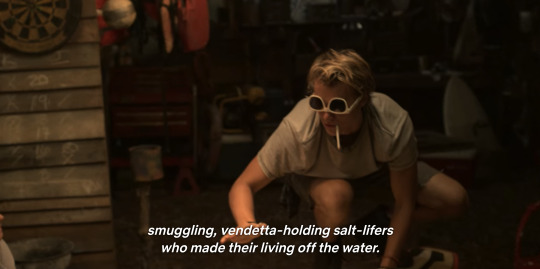

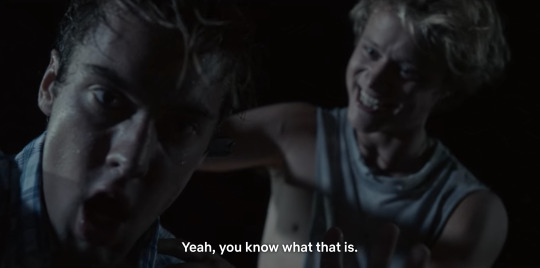
Based off of his excitement over the gun and trigger-happy attitude at the kegger, I think it's fair to say that he's likely not gonna be people's favorite character right off the bat. He's definitely the kind of person to act first, think later, and that could turn a lot of viewers off of his character at first because he's just too unpredictable for seemingly no reason.
However, we do get our first hint of something more when he has his “we got nothing to lose” speech, which shows some real desperation as he alludes to how he and John B, unlike Kie and Pope, truly have no one else in their lives who give a shit about them. The two of them are the least likely to ever actually make it out of the Cut, and alongside his frustration, there’s a vulnerability behind JJ’s words during that conversation that signals towards something deeper in his character. He feels like a real, multifaceted person for the first time in this moment, not just the crazy comic relief archetype.

(I think Rudy had said in an interview that this was the scene that he auditioned with, and that JD had helped him find the emotion behind this moment, so everyone say thank you JD for helping to create this nuanced brilliance)
Moving onward from this point, there are some other, small hints towards JJ's home situation in the rest of 1x01 and 1x02, like when he mentions how his dad made cargo hides for smugglers, did some of his own smuggling back in the day, and that the creepy guys who chased the Pogues through the marsh remind him of some of his dad's friends.
But in 1x03, we get our first real "oh shit" moment about JJ, and the way that it's done is just so fucking good.
JJ tells the security guard at the salvage yard that Luke had forced him to break in to get his cutting torch back after getting fired, threatening to hit JJ again if he didn’t do it. And based on how JJ has been characterized thus far as highly charismatic, resourceful, and quick on his feet, it is fair to assume that he’s completely making this up and is just a really good liar. But what’s so great about this moment is that while it is actually rooted in a very vulnerable and truthful reality, there is still too much that we don’t know about JJ’s home life to really know for sure what’s true.
We’re meant to kind of flip-flop between thinking that JJ is just putting on a show (because he’s been firmly characterized as "the funny one"), to questioning if maybe there’s actually some truth to his story (based on the fact that he tears up), and then back to thinking that it was all an act (since he smiles and wipes his tears once his back is turned to the guard).

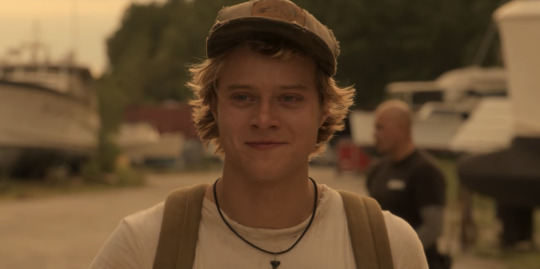
So through this moment, we peel back another layer of JJ’s character, but it still leaves a lot of mystery left to uncover because it’s incredibly unclear what’s true and what’s just JJ being quick on his feet. This is the first time that the idea of abuse is explicitly tied to JJ’s character, and whether the audience thinks he is lying or not, that seed is still planted. After watching this moment, it's only natural to start looking deeper into everything that JJ says, especially when it seems like he's joking, because you feel like you can't really trust his surface-level characterization anymore. And the entire theme of JJ being a good liar that persists throughout the entire series gives me chills for this very reason. Fucking poetic cinema it’s so good.
Some smaller hints towards JJ’s home life are also dispersed throughout this episode, with the audience’s first look of Luke at Barry’s (before we even know that it’s Luke), JJ saying that Luke had gotten fired from the salvage yard for showing up shitfaced, and even JJ scrambling to make a sandwich with moldy bread, which on a rewatch is much less funny and much more depressing (like many things involving JJ). There's other elements to how JJ's story is revealed that I'm gonna talk about in later posts, but god I love this scene so much so it needed its own post.
I just adore how JJ is clearly introduced to us as one thing and then the rug is totally pulled out from under us, revealing that there is definitely more going on with him than we were first told about. It gives his character such an interesting dynamic with the audience right off the bat, and although all of the Pogues are complex and multifaceted, there isn't a slow unfolding of their characters like there is with JJ. I might just be projecting here, but I think that a lot of people connect to his character partially because of how the writing allows your perspective about him to shift as you put more and more pieces together with each passing episode.
The "more than meets the eye/tragic backstory" archetype is just so superior in every way, and this is a great example of how it can work so well to build a compelling character.
previous post // next post
#this is the kind of shit that gives me hope for s3's writing#the pates really did that#sof thinks too much about obx#outer banks#obx#jj maybank#rudy pankow#obx s1#obx season 1
57 notes
·
View notes
Text
Queerbaiting and Buddie
(word count: 1,900)
I keep saying that I don’t want to spend any more time on 9-1-1 meta or fic, but the events of this weekend made me open up a document where I had some unfinished meta and in light of the S4 finale airing tonight, I thought I might at least write this:
“Queerbaiting is a marketing technique for fiction and entertainment in which creators hint at, but then do not actually depict, same-sex romance or other LGBTQ representation. They do so to attract a queer or straight ally audience with the suggestion of relationships or characters that appeal to them, while at the same time attempting to avoid alienating other consumers.”
That is how Wikipedia defines queerbaiting. And I really feel like everyone needs to read that and then read it again and realize that what is happening on 9-1-1 with Buddie is NOT queerbaiting.
I don’t want to go into the long history of queerbaiting because we would be here all day and anyone that wants to do some research should go and do so. There are a lot of resources out there. Use them.
But the short of it is this: queerbaiting has a lot more to do with the way a show is promoted, with the way that anyone involved in the show talks about a queer ship, and with the show deliberately scripting scenes that hint at a relationship without any intention of following through. Expectations and wanting a queer ship to go canon and those expectations not being met do not alone equate to it being queerbaiting.
For any of us that have been around a long time there are a lot of perfect examples and if you compare Buddie to any of them, they are very different. I’ll name a few:
Merlin/Arthur
John Watson/Sherlock
Emma Swan/Regina
Derek/Stiles
Castiel/Dean Winchester (though they did go canon...barely)
Lena/Kara
Buck and Eddie do not fit into that list. Which isn’t to say that someday they could belong there, but I just do not believe that they will even if Buddie never becomes canon. And this all lies in how Buddie as a ship has been treated both on screen and off. I’ll break it down by season.
S2:
Eddie is very clearly introduced as a new character, a straight Army veteran with a disabled kid and family drama. He and Buck have immediate chemistry. We can’t deny that, or deny that from that first episode there are immediate sparks. Unintended sparks, but sparks nevertheless. And it is easy to tell that no one on the production team expected that and the story reflects that.
Yes a foundation for their friendship is formed and yet the season long story focuses on Eddie’s relationship with his estranged wife and Buck is dealing with his own growth after being left by Abby. Their friendship shines and their scenes are great but none of them suggest romance and there are actually a lot of episodes where Buck and Eddie barely interact in S2 aside from in the background or for small work related moments (this mostly happens after Shannon returns).
S2 does give us the first acknowledgement from the powers that be aka Tim Minear that they know what the fans have seen. This is why the elf scene exists, but it exists in a space where it’s a nod to the fans and not meant to do much more than that. The other moment is during the call with the livestreamer. But S2, places them completely and without question on a strong friendship.
S3:
We see a lot more conflict for Buck and Eddie in this season and we see how close and important they are to each other. Those are the two main things. That can be read as friendship easily and it’s a season where both Buck and Eddie deal with their pasts and in one way or another start to get closure while their friendship remains intact.
Yes there are some scenes that make us squint and go huh, wtf? (I’m looking at you kitchen scene), but narratively we also know that neither of these boys is ready for a real relationship with anyone, let alone each other. But we can bask in how close they are as well as how Christopher fits in into all of it.
But in S3 we are also introduced to Ana and we see the return of Abby. We also get to see that Buck and Eddie have become closer than ever and that the lawsuit only serves to highlight the importance that they both feel about having the other available to them. I’ll also quickly mention that Eddie Begins worked hard to highlight Buck’s devotion to Eddie.
S4:
Without considering the events of the finale (I am avoiding spoilers and know nothing about it or the speculation), we’ve seen Buck and Eddie both grow and get further closure on their past. This season has paralleled them well and their friendship has not faltered, they’re as close as ever.
The beginning of the season was heavily focused on Buck and we saw him grow as a person and begin to work on himself in a healthy way and we’ve seen Eddie be supportive of that.
We also have Ana to consider and her relationship with Eddie as well as the return of Taylor and yet the appearance of these women has not changed the Buck and Eddie dynamic. And I find it fascinating that Eddie beginning to date Ana, is the thing that prompted Buck to start dating. The parallels are all over the place but it is the strength of the friendship and the way they care so deeply about each other that remains whether that becomes romantic is still to be seen, but it could still go either way.
Off-screen by the end of S2, Tim Minear had already addressed Buddie by throwing in that elf scene in a wink/nudge fashion that said “I see you” and in the scene with the girl with the livestream with the comments. During S3 he tweeted about being frustrated by the fans demanding and being hostile and thinking that that would make him more likely to do what they want (I’m paraphrasing what I remember seeing). Tim has never once said that Buddie will happen or shut the door on the ship entirely, but he did say he did not want to engage in conversation about it because he doesn’t want to get into arguments with fans.
Oliver has always been enthusiastic about Buddie and has even said that he would be perfectly fine with it happening both a while ago and more recently in promo for S4. Conscious of queerbaiting and not wanting to give fans false hope, he has specifically said that he does not know if it will or won’t happen and that he wouldn’t speak on that as he’s not the one making that decision. His support for it happening does not mean he has any sway one way or the other. He’s said this a few times and even wrote a letter to the effect to make it clear to fans that the last thing he wants is to disappoint someone due to something he’s said.
All in all, it just isn’t a constructive environment for anyone working on the show to interact with fans on this topic because any time that they do, they get attacked by overly enthusiastic buddie shippers that in many ways are making everything worse.
In all of the interviews from Tim that I’ve seen, he has always been very quick to hint at what was coming up on the show in a way that at times has been misleading on purpose. The number one thing that comes to mind is early in S4 where Buck was said to get a new woman in his life. Tim absolutely made it out to seem like it was a girlfriend while knowing fully well that it was a therapist. This is an excellent example of what promoting and hinting is actually like. No one from this show has done that in regards to Buddie.
No one has gone out of their way to hint that it may happen in a way that excites the fans. And this is one of my main reasons for knowing that Buddie is not a queerbait. At no point in the life of the show so far has anyone used Buddie in a promotional way to bring in viewers. Because THAT was the whole point of queerbaiting in the past.
It was a way that some showrunners found to bring in a lot of viewers when they needed to up their numbers in order to show networks they were worth keeping around. Someone figured out that LGBTQ people wanted to see themselves represented so much so that they would tune in to anything that promised an LGBTQ character in some fashion. It was a tactic that worked well in the landscape of tv where there was so little LGBTQ content on mainstream media that anyone wanting it would latch onto anything. And then they just wouldn’t deliver on those relationships or characters. In 2021, that is not the world we live in any longer.
In today’s tv landscape there is so much to watch and so much to pick from and diversity has grown, it is celebrated. Queer characters are well represented as are queer relationships and queer stories. The times are different. A while back I was listening to a podcast (Bait: a queerbaiting podcast) and something I found interesting was how the hosts both agreed that in today’s tv landscape there is no more real queerbait and that we won’t easily find anything like the ships I mentioned above. I think I agree more with this than I expected to, because I do think that it exists in some spaces, but it definitely isn’t what it used to be. This is a good thing.
Specific to 9-1-1, this is a show that has that diversity and that isn’t afraid of tackling that diversity and giving us interesting and nuanced perspectives and stories embracing that. We have characters of color, women in positions of power, a F/F relationship, two multi-racial relationships, a disabled character, other queer characters including a M/M relationship. There is so much in this show that embraces diversity and that embraces the reality of what the world looks like. To call it queerbait is to disrespect everything else that this show is and has done and the hard storylines that have been tackled that we would not have seen on tv ten years ago.
And I get that Buddie would be another breakthrough. It would be a novel way to tell a queer story, and it would be amazing if it were to happen. The set up is there, but it isn’t fully realized, and Buck and Eddie can still be read as just friends if we take off the shipping goggles. But it also isn’t queerbait or likely to become queerbait and people have to stop calling it that.
What Buddie resembles is one of the many unintended slow burn ships that have frustrated viewers in many forms across fandoms and we just have to go along for the ride and maybe it will happen. Or maybe it won’t. But if we know anything about relationships on tv, it is that a lot of the fun comes from the journey, even if the destination is good too.
#911 fox#buddie#911 meta#911 on fox#buddie meta#buddie is not queerbaiting#long post#this is almost 2k long
227 notes
·
View notes
Text
please stop misusing the word “queerbaiting”
hi, so I’ve been seeing a lot of buddie posts with the term “queerbaiting” inside, and I feel like saying that it isn’t queerbaiting. Queerbaiting is a very serious word to use and I don’t think it should be thrown around.
so, first of all, what is queerbaiting? Sarah Z made a pretty good video explaining what it is.
youtube
TL;DW (tho I strongly recommend you watch to educate yourself), a general definition of queerbaiting is that it is a deliberate attempt to hint at a queer relationship through editing, dialogue, editing, irl declarations without ever intending to actually portray the queer. It is usually done because creators want to attract the queer fanbase and gain more money without ever facing the possible backlash from homophobes and country bans and so on
classic queerbaiting examples include 🎉sherlock🎉 In the show, there's s o m u c h subtext (uh go look at some meta if you can't see where) hinting at johnlock. But the creators (mofftiss :'D) just make fun of it. It's played off as a joke where a lot of characters often mistake sherlock and john as a couple, john screams "i'M nOt gAy!!!" at them (yes dear we know you're bi, contrary to popular belief, you're not just a myth), people laugh at the "no homo bro" and the show moves on.
so, 911 is definitely not queerbaiting. It has good LGBTQ+ representation. 911 isn't queerbaiting because it already pOrTrAyS tHe QuEeR!! Quite loudly, I'd say. For example: Hen and Karen, Michael and David, TK and Carlos (technically in lone star but still-)
And these characters are the main ish characters. They have episodes and plot lines dedicated to them, and they aren't discarded once the show has a ✨badge of progressiveness✨. It's not like they went "boom you're gay"ed (cough Rowling cough) on the characters just to get support from the queer fanbase
911 portrays real challenges the queer community faces (unlike movies that only have straight gay teens <- go watch). So it's definitely safe to say that 911 doesn't queerbait at all.
okay, then what's up with the buddie relationship subtext?? Here's a pretty good article on the difference between "queerbaiting" and "ship teasing". TL;DR (again, do go read when you have the time, it's short), ship teasing is basically hinting at a relationship but not delivering it (yet?)
All queerbaiting is ship teasing but not all ship teasing is queerbaiting. The difference in between is that queerbaiting tends to focus and hint more on the sexuality part, instead of the romantic potential. Basically, not all queer subtext is queerbaiting. I really like the conclusion paragraph of the above article and it kinda says what I've been thinking. So I'm gonna quote it here:
Queer representation isn't as simple as characters kissing. It's about nuanced and diverse representations of LGBTQ lives. It's superficial to say queer rep is invalid if characters don't end up dating and it's even more superficial to say that if a queer relationship doesn't meet an individual's standards, then it's queerbaiting. This term is necessary for discussion of queer rep -- but please use it correctly.
I'm not saying "oh all hail fox, it's just ship teasing". Ship teasing could be done right and would be a fun little game to play with the audience if it's a slow burn.
But ship teasing could also hurt. A lot. If buddie isn't canon or endgame, all the subtext and the hinting will just feel like the creators are laughing and making fun of us. Well, I guess all we can do now is pray and hope lmaooo. At least give us bi!buck and maybe buck and josh🥺🥺
in conclusion: 911 isn't queerbaiting, please stop calling it that and make a prayer circle for slow burn buddie
anyway, this is getting a bit long and I have a ton of hw that I have been disregarding for the past hour. Please correct me if I got anything wrong or left out anything!!
#queerbaiting#queerbaiting tw#911 fox#911 lone star#buddie#ship teasing#evan buckley#eddie diaz#sherlock
182 notes
·
View notes
Text
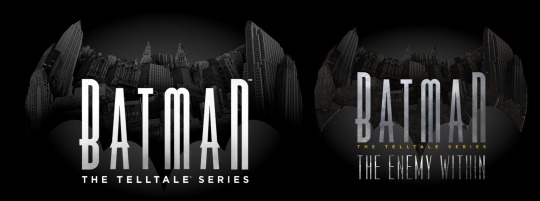
Combined Review; Batman: The Telltale Series and Batman: The Enemy Within
Developer: Telltale
Rrp: £11.99 (Gog.com, Humblebundle and Steam) [Both are this price individually]
I think its safe to say that everyone knows who Batman is and at least a few details about him be it his parents being murdered, him being a vigilante or even just a member of his rogues gallery. You'd be hard pushed to find someone who doesn't know at least SOMETHING about him. Because of this any media that uses the character tends to only put a small amount of emphasis on his origins as it's so well established. That isn't the case with the first game, not only does it cover this well trodden ground but it also rehashes some of the facts adding more nuance to the whole affair.
In fact this whole game is about the affect of the death of Bruce Waynes parents, not just on Bruce himself but on Gotham as a whole.
In the second game the focus much more on a character who was instrumental but also appeared only briefly in the last game, one John Doe. For the sake of spoilers I won't mention who he's clearly destined to become later but lets just say he's kinda' a big deal as are the 'friends' he's surrounded himself with.
Because of the nature of these types of games, I won't go into specifics about the story or even the characters that appear (beyond that hint just now). But lets just say that anyone who is a fan of Batman will find a lot of interesting twists in the tales of their favourite villains as well as some cameos from the less well known ones.
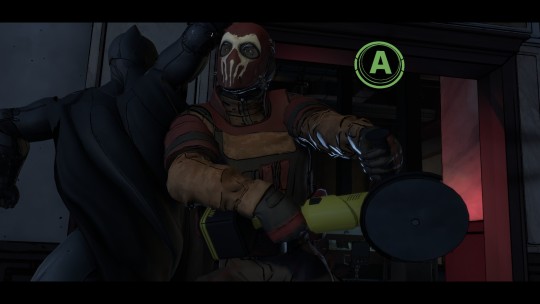
Of course, like almost every Telltale game the choices you make will have an influence on what happens later in the story. However, one thing this game does that the others don't is the investigations, Batman is known as 'The Worlds Greatest Detective' after all, it would make no sense if all he did was punch the bad guys (he does that too). In these investigative sections you need to try and piece the evidence together in order to make sense of what's in front of you. Its quite a simple affair, involving looking at an item and selecting it then walking to another and doing the same. If these two items are directly connected in the story then Batman will explain how.
From a graphical and mechanical standpoint both of these games look essentially the same, although there is a 'shadows mode' microtransaction you can buy that will change the look. This is a practise I highly disapprove of but if you want to spend an extra £3.99 for what amounts to be a skin change you go for it.
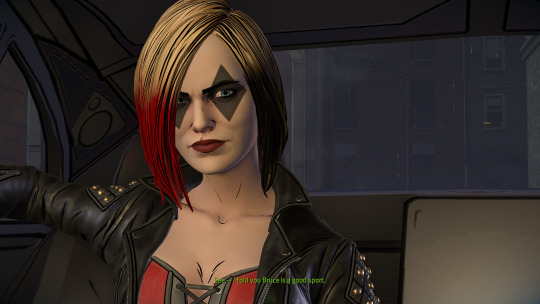
I have to say these games kept me on the hook the whole way, the stories were interesting and had quite a number of twists and hooks that kept me pleasantly surprised.
#batman#telltale#batman the telltale series#batman the enemy within#Combined Review#game review#games review#game reviews#games reviews#video games#video game#video gaming#bruce wayne
6 notes
·
View notes
Note
Okay, so I kinda wanna know your thoughts about how weird the fandom portrays the bat characters. Canon is ... not my favorite, but it actually offers a lot of nuance to the characters that I think makes them all interesting. Unlikable, but interesting. I noticed fanon tends to boil the batkids all into these superflat caricatures. Like, cereal obsessed manchild Dick Grayson or bad boy who's literal crimes are only because of the lazarus pit Jason Todd. Its not really a major problem, just weird
Oh I have a LOT of thoughts about this. I try so hard not to shit on how other people interact with content because like, it’s comic books! We’re all just here trying to make the best out of a mess of stuff and have fun, but admittedly a lot of fanon stuff drives me fuckin’ nuts as someone who reads a ton of comics.
Like, I like memes, obviously, I draw tons of memes with the batfam (+ yj) characters and make lighthearted jokes etc etc, and honestly if it’s just for jokes then I don’t mind people having whack interpretations of the characters quite as much. The thing that drives me up a wall though is like... when serious works and analysis and discussion are very clearly based on just the fanon interpretations without any bearing on canon aside from what you could skim from a wiki page, and it’s spoken like it’s fact! There’s ‘having fun with jokes that aren’t taking things that seriously’ and then there’s ‘blatantly mischaracterizing based on misinformation’. Way too often I see things fall into that second category.
Now, a lot of people in the batfam fandom don’t... actually read comics (or at least not frequently) and that’s not even a bad thing necessarily, like you’re 100% allowed to enjoy content however you want to! (I don’t wanna be gatekeepey, especially since comics are confusing to get into)
But the problem is that when a lot of people aren’t reading the comics, then the people who do’s opinions have a lot more influence if they’re loud enough. All it takes is one person who read something and interpreted it a specific way that might not even be correct, and then it can echo chamber and suddenly half the fandom thinks it’s 100% canon that way because ‘oh so and so said that and they actually read it’.
I also think that’s a problem with the popularity of out of context panels/blogs, while they are super funny sometimes, when people make assumptions about characters based on just a few things without context... it can lead to problems. If enough people say something enough times people just... start to think it’s true, even if it exists entirely devoid of context which changes the meaning.
Like, for example, according to canon there’s no actual confirmation Tim stalked Batman on foot for an extended period of time! We know from Lonely Place of Dying that he followed him once to get a picture to convince DIck that he still needed a Robin. Otherwise his ‘stalking’ & how he figured out Batman’s identity was more through media appearances (like newspapers and tv). This is wildly different from the common fanon idea that little Timmy was sneaking out regularly to follow Batman & Robin around with his camera.
I primarily blame Geoff Johns for this misconception because of these panels in in tt 2003 (from issue 29)
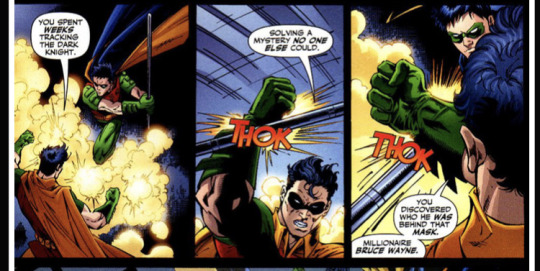
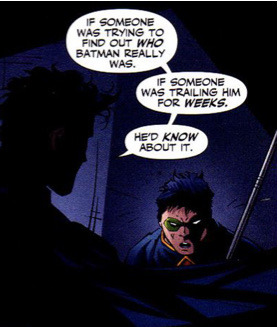
But like, think about it for a second, literally how would Jason know that? This is one of the first times he’s ever interacting with Tim, and he was dead/catatonic when that would have been happening! He is either making a wild assumption or perhaps Talia told him this when she told him about Tim, whichever of those it was it’s secondhand information not something he witnessed. Taking his word as fact here makes no sense, he was just trying to get under Tim’s skin while fighting him. But seeing those panels out of context if you haven’t actually read Lonely Place of Dying/only read a vague summary of it, and don’t necessarily know the details of the Jason situation, it could absolutely lead you to believe otherwise!
Dick as a cereal manchild is a weird one because like... okay yeah sure he likes cereal, I can think of like two panels I’m too lazy to find right now off the top of my head of him having it, but... that’s not something we see all the time! Its not like Ollie & his chili (which IS a running joke- seriously I have not read that many Green Arrow comics but the amount of times I’ve seen that man bring up chili in just in the few things I have read is wild. there’s even an official recipe. his chili has it’s own dc wiki page). Then, because Dick isn’t quite as emotionally closed off in the same way the rest of the batfam tends to be, people project literally all the pent up feelings onto him, making him this hug-crazy crybaby manchild... again it’s just very clear people who perpetuate those ideas (outside of like, maybe as jokes) haven’t actually fully read that many comics with him. I’d also even blame the Young Justice cartoon version of Dick for some other traits fanon Dick has, bc that version of him is def a bit of a Hot Mess™️ once he’s Nightwing
Jason I understand misconceptions about probably the most because of how wildly inconsistent his writing was before the new 52 and how consistently Not Great it was once Lobdell took over. Jason’s one of the few characters I have read like, 90% of appearances for so I’m speakin’ from experience here. But still... acting like Jason as Red Hood is just a ‘bad boy rebel’ that could have a relatively happy connection with the whole Batfam is fun but unrealistic. You can not blame everything on the lazarus pit... he still has killed people! Lots of people! Willingly! Yes he has reasons and when he’s being written well it’s clear that he’s not just ‘random murder happy’ but rather ‘I kill when I feel they deserve it and that it’s necessary’ which is what keeps him an anti-hero rather than a full fledged villain most of the time, but that still keeps him so at odds with the rest of the Batfamily! Writers in more current continuity have had him compromise by only using rubber bullets in Gotham so they can have him interact with the family, but he’s still killed and will do it when he deems it necessary.
Also like... at the time of Under The Red Hood in the comics... theoretically... he hadn’t even been in the lazarus pit for well over a year. Go read Lost Days (it’s short! And except for the thing with him & Talia towards the end of the last issue it’s pretty good!), he spends a lot of time traveling the world and learning things/training before the events of UtRH. Yes you could interpret there still being some Lazarus influence going on there but I think the movie version of UtRH especially leads people to believe there’s a lot less time between his dunk in the pit and his first actions as Red Hood.
Fanon also has a lot of ideas about pit madness that vary wildly from what we have seen in canon, like yeah it’s been said to be a thing to some extent, but there’s not really the Danny Phantom Glowing Green Eyes™️ or anything like that... it’s fun to explore cool new ideas for sure but I just think it’s important to recognize the distinction between things that are actually canon and things that are popular fanon. (Also there are things that fall somewhere in between, there’s definitely stuff that isn’t 100% confirmed canon but could still be plausible/has been hinted at by some writers/is only canon in some settings)
Other things that drive me nuts are ‘quiet does-no-wrong angel Cass’ and ‘the Normal One™️ Duke’ because those just make literally no sense if you’ve read any comics with either of them... but fan content either does those versions or just completely ignores their existence a lot of the time! So! That’s a whole bigger problem!
In general though, this is fandom it’s not like this... matters that much on the grand scheme of things in life, we’re just people on social media talkin’ about comics. And this kind of misconception/flattening of characters does happen in literally every fandom ever. But it still does suck to see characters that have a lot of nuance and interesting history to play around with get reduced to a few traits that aren’t even actually that relevant to who they are.
#batfam#pls dont kill me for sayin al this again im not telling anyone how to enjoy stuff JUST my thoughts
39 notes
·
View notes
Text

The first thing to keep in mind, is that the OC has to be coherent with the story and the setting. You need to slip them in your fic in the same manner you would add a different species of fish in Kirari’s aquariums, that is, seamlessly and without much racket. They have to be weaved in the background and plot without disrupting the setting, but at the same time they can’t just be soul-less puppets, ready to be discarded as soon as you’ve used them for your plot-points.
These are the main pieces of advice I can give:
1) make sure you know who your characters are and why the story needs them
2) use the narrative technique of “show, don’t tell” to make them come alive in your stories
3) refrain from using excessive flashbacks, dialogues and descriptions.
4) practice, practice, practice and have fun
I will now talk about all of this a bit more in depth.
Let’s start with the character itself.
In order to create an OC you have to ask yourself:
1) what is their purpose in terms of plot
2) how do their actions and existence influence the world around them
3) how many times they appear.
In a word, you have to know how relevant they are to your story.
The more relevant they are, the more you should work on their thoughts, speech, actions, backstory and appearance in order to give them the same depth as the canon characters. You should also remember, that technically characters like Grandma Bami aren’t OCs. Their personalities and looks might be original, but for the rest, they already have a place in canon, even if we don’t see much of it, so you have to pay more attention in order to ground them and make them believable.
Keep in mind that your characters are more than a face and a plot-point, that relationships can be paradoxical and varied and that every person has flaws and strengths. Now you should be good to go.
Once you’ve decided on who the OC is and what they do, it’s time to weave those characteristics into the narration. Of course everyone has their own way of narrating their stories and everyone has different reasons to use an OC. Here are some of the examples in my fics.
In Of Thorns and Petals, Sayaka briefly mentions her parents to Kirari. In particular, we know about her mother's job and that she was always quite busy and distant. We learn more about this when Sayaka compares herself to her through a brief recollection: Sayaka remembers her talking on the phone, pressing it between her shoulder and ear while she cooks, like a real woman (meaning a functioning adult). This is meant to show the nuances in Sayaka's relationship with her mother: Sayaka looks up to her as as role model, and at the same feels her distant because she was always too busy to build a proper relationship with her.
Althought we won’t see Sayaka’s parents for God only know how many chapters, it was important to mention them now in order to establish that they exist, so the reader won’t be confused to see them at a second time and they won't feel out of place when Sayaka (and the narration) will require their presence.
Another OC of mine is Naosuke. Naosuke is merely a servant of the clan. In In the Shade of the Orchard we learn about his story, but his main function as narrator was to allow us to learn about Grandma Bami, about her cruelty and at the same time about all the characteristics that made her a woman worthy of admiration. In later works like OTAP he's a connection between past and present, between what the twins used to be when Grandma was around, and what they've become. He offers a contrast too, between the hatred they have for her and the reluctant admiration and devotion he always felt (i.e. Kirari suspects him of bringing her peaches when she goes to visit her Grandmother in Blood's Sickness).
Although Naosuke is now a background character in most of my fics (AUs and not), you don’t need to read In the Shade Of The Orchard to know who he is. We get to know everything we need about him at the right time through the right dialogues, actions and recollections, without disrupting the present narrative.
Naosuke and Sayaka’s parents are both examples of a “show, don’t tell” style of narration. Although it might take some practice, I believe this is the best style when it comes to introducing OCs, as it feels more natural.
See it as a painting and every detail is a brush stroke that will bring the composition together: Kirari recollects that her father often looked tired; and that the same tiredness often turned into something very similar to fear when he came out of Grandma’s office. Today, in the present moment, he doesn’t smile often and he never shows himself proud of her, notwithstanding all of her accomplishments (meaning, he sees too much of Grandma in Kirari and it’s taking its toll on the relationship between them). Here you have the portrayal of a weak, tortured man and his change throughout the years. You only need to give him a fitting appearance, perhaps bright blue eyes that look older than what they are.
Want to introduce an OC that has no real, possible connection to canon? Work in the same manner and make up everything you need.
The man sitting before Sayaka keeps playing with a lighter. He doesn’t look scared or nervous, but he has his own kind of restlessness. His eyes are indifferent and there are deep shadows under them; his hair is clean and cut, just like his nails, but there’s the first hint of a beard under his chin. Sayaka thinks that his suit looks too new, as if the price tag is still behind his neck.
Later on, when Kirari will arrive, she will amiably ask him if his flight went well, and he will tell her that her cousin was very clear in her instructions.
In a few lines we learnt that this man smokes or has a connection with fire, that he looks after himself but that Terano forced him to fly to Hyakkaou in such a hurry that the only way to make himself presentable was to buy brand new clothes, plus that Kirari isn't surprised to see him, so she probably knows him.
Kirari, Sayaka and John Doe himself will tell you this. I, as the narrator, am merely showing you their thoughts, words and appearance.
What you shouldn’t do in order to achieve the same result is use paragraph after paragraph of flashbacks and dialogues. In the first case, you will interrupt the flow of the narration, detaching the reader from the present; in the second one you might lose their interest.
When working on descriptions in general, be sure not to exaggerate. If you sap the subtext, you will only bore the reader (remember all those Jane Austen character descriptions? XVII Century English literature wasn’t that fun because the writers passed too much time telling us about each damn piece of clothing on their characters). Consider that most people don’t even notice each other’s eye color unless there’s something peculiar about it.
Last but not least, the more you get acquainted with your OC the better your narration around them will become, most importantly if you enjoy what you’re doing. There’s an intimacy between me and Naosuke; built on the fact that I and only I know most of his feelings and thoughts, only I know how he could react in a certain situation or not. When I think so much about it, it is extremely satisfying to bring all of that in my stories. Naosuke came to life first because I needed a “walking camera” and second because I was having a lot of fun writing him.
If it’s your first time writing an OC, don’t be afraid to come up with a Mary Sue. Humans are complicated even in fiction and only through practice (and reading) you might learn how to avoid certain mistakes sometimes.
Remember that it’s fanfiction. Be happy first, worry about technique later. Don’t be afraid to write as much as you can about anything you want and don't get discouraged if you can't write like James Joyce right off the bat.
I hope my answer and the examples I provided were useful. If you do end up writing something, please let me know!
13 notes
·
View notes
Text
Why IDW Starscream deserved his redemption arc (Pt. 2)
Pt. 1: A small hint of ‘goodness’
Pt. 2: The different IDW Starscreams
In the last part I talked about how the original G1 cartoon left us with a hanging question about Starscream’s moral capacity for ‘goodness’, the possibility of a little ‘something more’.
In this part, I want to talk about: actual, ‘good’ traits of Starscream.
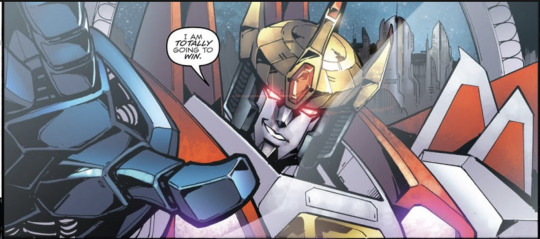
Obviously, Starscream is a well-established bad guy of the franchise, whatever the continuity.
The traits most easily associated with him are also largely, if not all, negative. Traitorous. Cowardly. Self-centred. Egotistical. Brash. Opportunistic. And that’s only what distinguishes him from the other Transformers villains. Add on the standard Decepticon ‘values’ of ‘cruel, ruthless warmonger’ and a sadistic penchant for violence and murdering people...
Yeah. Not a good guy. Tick.
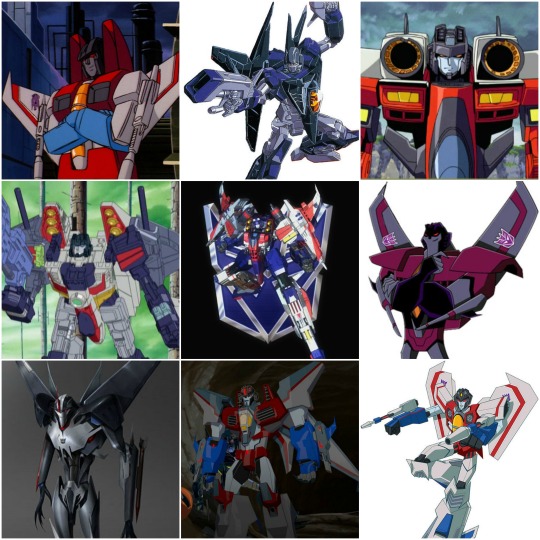
But just because a person has bad morals or values, does NOT invalidate any of their strengths, competences, or positive traits in general. Just because they use their strengths to further a bad cause does NOT mean those traits are now invaluable, or useless, or ‘evil’.
Writers who are able to take this into consideration, who can recognise that not all personality traits need to be portrayed as purely ‘good’ or ‘bad’, are writers who can create interesting, perhaps even likeable bad guys - despite, or even because of their badness.
And, here, I would argue that, for most writers of an IDW G1 Starscream, there is an acknowledgement of Starscream’s actual competences and ‘positive’ traits - even though interpretations of these ‘positive’ traits do differ somewhat between writers.
And if we are able to build on these interpretations, we will find ourselves with an image of Starscream that feels much more hopeful, and is certainly much more nuanced and complex than... others. (*cough cough John Barber cough*)
(Spoiler alert: Transformers: All Hail Megatron, Transformers: ‘Til All Are One, The Transformers (2009))
Shane McCarthy’s Starscream (Transformers: All Hail Megatron, 2008-2009)
Without outright portraying Starscream as a character worthy of moral redemption or sympathy, Shane McCarthy’s Starscream is one of the more positive portrayals of the character.
While this Starscream exhibits the same petty, almost childish competitiveness reminiscent of the original G1 Starscream - getting very riled up when Skywarp suggests he’s unable to inspire as much fear and destruction as Megatron could - he is also highly competent.
Firstly, he challenges Megatron with valid, meaningful criticisms of his plans after conquering Earth. He correctly points out that Megatron has lost his sense of purpose, and his vision for the future. They are questions to which Megatron has no answers.

And once Megatron failed to step up to the bar, Starscream organises a coup which poses an actual threat to Megatron’s position as leader of the Decepticons.
If it wasn’t for the Autobots’ arrival, I believe the Starscream VS Megatron coup could at least have a 50-50 chance of success. Not only did he manage to sway a significant number of Decepticons to his side, but he also surprised Megatron by taking over Devastator, Megatron’s then most powerful soldiers and the only Combiner team (I believe).
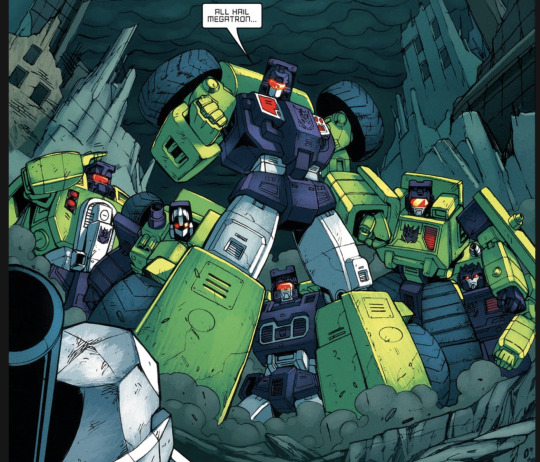
What’s more, his capabilities and power are openly acknowledged and respected by Megatron.
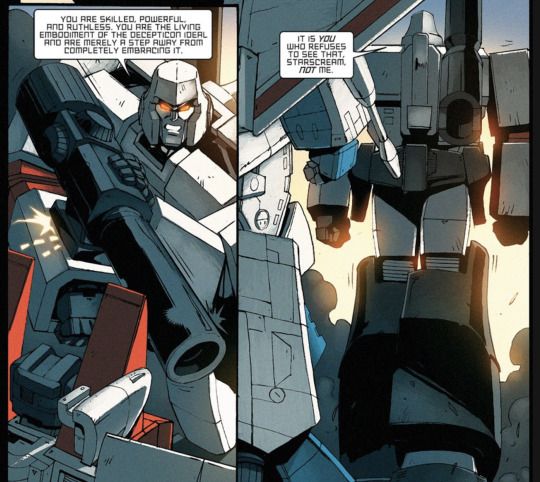
This respect for Starscream is something which very few later IDW writers choose to incorporate into their interpretations of Megatron. Many, instead, favour the more G1-esque Megatron-Starscream dynamic of bickering and insulting with a darker twist which borders abuse. (In later parts, I will also explore how re-interpretations of the G1 Megatron and Starscream dynamic affects the interpretation of both characters).
And, indeed, there is something honourable about McCarthy’s Starscream, who, in issue 12 of All Hail Megatron, chooses to save Megatron from the Autobots so that he may earn his leadership of the Decepticons.

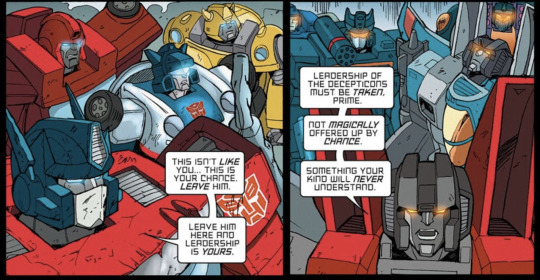
Granted, I think this happens more out of plot convenience, so that Megatron can continue as the leader of the Decepticons in later series. But still, this has important implications for our understanding of Starscream’s character - and Shane McCarthy’s Starscream is a respectable character, even if he is on the ‘wrong side’.
Mike Costa’s Starscream (The Transformers, 2009-2011)
The first thing Mike Costa’s Starscream does is... Throw Shane McCarthy’s Starscream’s sense of honour out of the window. Almost immediately, he’s torn between keeping Megatron’s husk alive and repairing him to function, or snatching Decepticon leadership during the power vacuum and killing Megatron off in the process. Which makes you wonder why he saved Megatron in the first place.
But despite the inconsistency, Costa’s Starscream forms an interesting, tragic character. Although his Starscream does not necessarily exhibit competence or positive strengths in the same way as McCarthy’s Starscream, he certainly experiences and goes through feelings which readers can be sympathetic towards.
One of which is guilt.
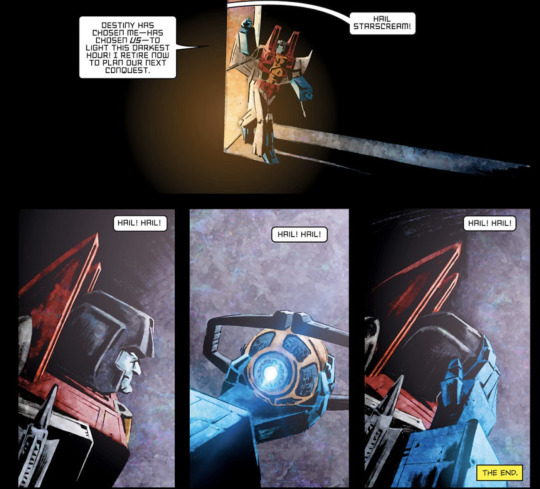
This is Starscream in issue 13 of All Hail Megatron, shortly after lying to the other Decepticons that the Autobot’s Matrix of Leadership has chosen him as a leader. It’s a valid political move, using religion to aid your support.
But here, you get the sense that this a Starscream who does not enjoy the deception. He does not blindly rejoice in power, and he feels no joy despite finally obtaining what he has desired for so many millions of years.
Instead, he is filled with fear, paranoia, doubt, feelings of inadequacy, and a horrible, horrible sense of disappointment.
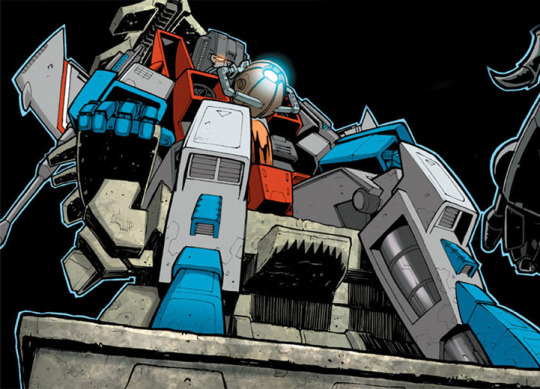
This is a Starscream who recognises his own incompetence.
In contrast to the original G1 Starscream, who is something of a bumbling fool too happy to self-indulge in his power for his own ego rather than actually using it to practical purpose, this is a Starscream who is finally confronted with the realisation that he cannot lead, cannot fulfil his grand ambitions in the way Megatron could.
And it crushes him.
This is NOT a fear that would occur to a shallower, simple-minded character who cared only about titles, egos, and their own glory. A Starscream like that would never even consider it.
Because both McCarthy and Costa’s Starscream are legitimately, and reasonably, disappointed in Megatron’s reign. Both aspire for power not for the sake of power, but for a higher purpose.
The Decepticon cause.

And if we remember that, in the IDW-verse, the Decepticons are depicted as activists responding to genuine oppression who gradually lose their way in bloodbath and war, then Starscream’s determination to remember and return to the original Decepticon ideals definitely highlights something more than ‘just’ a sadistic, self-centred, sociopath.
(Of course, there is no guarantee that Starscream’s own visions of the Decepticon ideals haven’t been skewed by war and bloodshed. The important thing is that he still remembers that their brutality should serve a purpose, which most other Decepticons rarely ever consider).
Costa’s Starscream is tragic - tragic because he must face the reality that he is the reason that he cannot achieve his dream. Because he is not Megatron. Because he lacks the charisma. The ability. The determination. The strength.
And that is something readers can sympathise with. Dreams being crushed. Ideals turning to ash. Fantasy morphing into bitter reality. This is the story of Costa’s Starscream - a broken idealist, someone who could have been something better than Megatron, but ultimately wasn’t.
Mairghread Scott’s Starscream (Transformers: ‘Til All Are One, 2016-2017)
Scott’s Starscream offers a very interesting, brave interpretation of his character - because it is her Starscream, after all, who takes the journey of redemption.
A lot of it comes down to the mechs Starscream is mainly surrounded by, as Supreme Leader of Cybertron. Bumblebee, Windblade, Ironhide, Wheeljack, and delegates from different colonies. Autobots, or else people who never knew him as the ruthless Decepticon Second-in-Command he once was. He has a chance to start with a clean slate.
And this is when things get interesting. Whereas most Starscreams pretend to have compassion, and sympathy, and morality, in order to profit from the latest scandal or betrayal, Scott’s Starscream is the complete reverse. (Particularly in TAAO).

Similar to Mike Costa, in TAAO, we see a Starscream who plots and schemes not because he necessarily enjoys behaving this way, but because when everything happens exactly the way he wants things to, when he has a chance to start completely anew with his legally established power, he realises that deception, violence, and manipulation are all he knows.
It’s what he expects of himself, and what others expects of him.
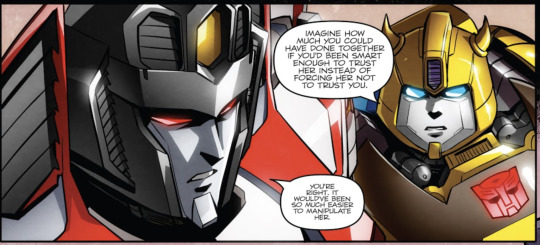
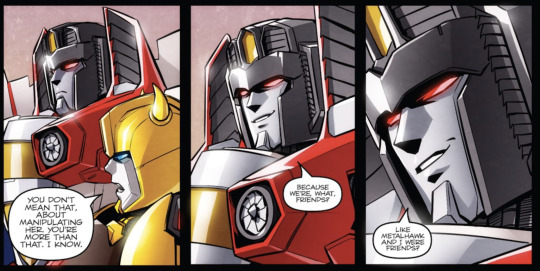
Look at that expression. That is NOT the expression of someone who is proud of what he has done, or the expression of someone who feels no remorse. It’s bitter. It’s ironic. It’s a look of self-loathing.
Scott’s Starscream has given up on himself. He carries on the despair of Costa’s Starscream, albeit with a subtle difference. Because while Costa’s Starscream despaired over the realisation that he cannot fulfil his dream as leader of the Decepticon Empire. Scott’s Starscream despaired over his inability to do good, to be a better person.
Scott’s Starscream, in short, has a conscience.
At some point, his plotting and scheming have become farcical. A ‘mask’, as Bumblebee puts it, which he can no longer put down.
This can be seen most clearly when he releases Chromia from prison. Note how all his ‘official’, surface excuses for freeing her are all to do with establishing his own political power and influence. Entirely self-serving, as most people would expect.
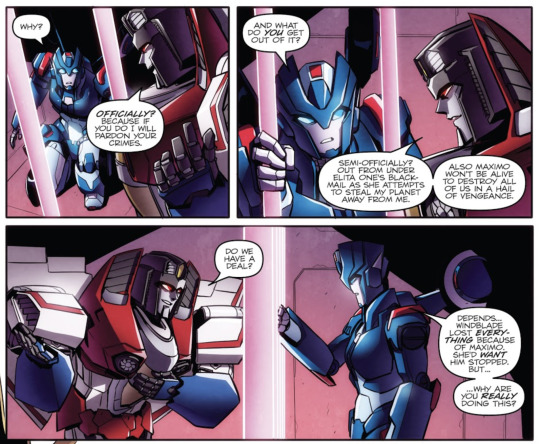
And yet, when Chromia sees through all of this, and asks him for the real reason, he answers with this:
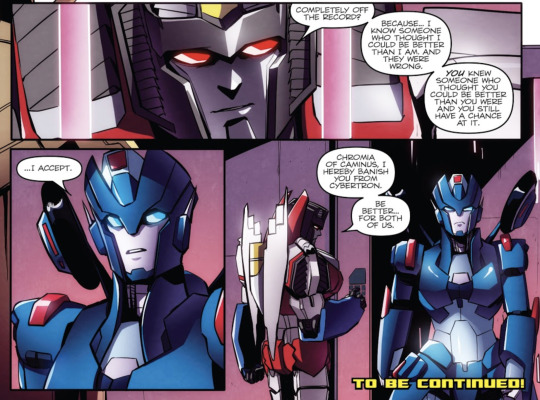
Unlike most other carnations, the self-serving, power-hungry Starscream had become the mask. Underneath it all, is a true Starscream who is attempting to atone, in some way, for his earlier faults (such as convicting an innocent Badgeless).
It’s funny how things can work out sometimes. How an innocent, almost naive faith can produce the greatest change in a way which violence and power never could.
Scott’s Starscream lives a tragedy, much like Costa’s Starscream, his story full of the could-have-beens and the sadness of someone who has lost themselves in the painful turns of war and its deceit. But it is in Scott’s Starscream where we see the greatest possibility for goodness - an awareness of right and wrong, a feeling of guilt, doubt, and conflict. And it is Scott’s Starscream who ultimately, chooses what would have been otherwise unthinkable for any other Starscream. He sacrifices himself, his ambitions, and his dreams - so that the world can do better without him.
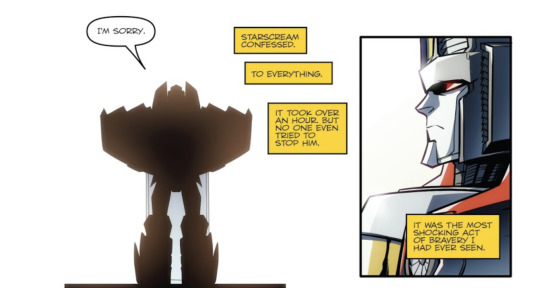
To summarise, while most writers show Starscream to be manipulative, deceptive, and conniving - they rarely depict him as someone who enjoys these betrayals. What’s more, he is not usually depicted as self-centred purely for the sake of being self-centred. Self-preservation, and the need to come out on top, are certainly a large part to his motivations, but they are never his sole motivations. They are usually accompanied by a genuine ambition to fulfil a certain ideology or vision of leadership, visions which are ultimately hampered by his own insecurities and inadequacies in the face of overwhelming responsibility. From this, we can see that IDW’s Starscream is a fairly nuanced, complex character, who is much more morally grey, much more competent, with a much greater capacity for good, than the G1 counterpart from whom he is inspired.
........ Aaaaand then John Barber came along with Robots in Disguise, smashed a sledgehammer into all those subtleties and character development, called him a ‘sociopath’, and created the least likeable, redeemable version of IDW Starscream possible.
Which brings me on to Part 3: Barber’s Biased Starscream
#starscream#transformers#idw transformers#2005 idw transformers#idw starscream#starscream analysis#character analysis#character essay#analysis essay#comics#transformers idw#i actually hate barbers starscream#maccadam#what is the maccadam tag actually for
168 notes
·
View notes
Text
TMA Ending Theories
Honestly I just wanted to put out my theories in a format with a time stamp so I can say what I got right or wrong, so we’ll just have to see how these hold up. (Note the first paragraph is just me talking about why I think guessing the ending for this series is hard and if you want to skip to the meat of the theories just start at the second paragraph.)
The biggest hurtle when it comes to theorizing the end of TMA is the mass amount of foreshadowing that goes in multiple directions. One episode it hints that John is going to die from not being able to survive without the Eye, the next hints Martin is going to die first, but then there may be some foreshadowing that John going to lose humanity and turn into a monster? It gives a lot of possible endings, with the added bonus of only some of them contradicting each other, a lot of the above examples can technically all happen at once but I think most people agree that’s probably not going to be the case. There’s more nuance to this, including the mass amount of character foils, but the general idea is that there’s a lot of places the story can go and it has lightly hinted at a lot of them. I feel like the best way to approach guessing the end for the show would be less of guessing what is going to happen, and more looking at what the major forces of the show want to happen.
What I mean by this is to say that we should look for the goals of the two most important entities, the Eye and the Web. I feel I should start with the one that I’m little less confident on, that being the Eye. The funny part is I’m not uncertain on what the Eye actually wants, it basically says it in the cabin statement (162):

[ID: Archivist (end part of statement for 162): This place wishes to be our tomb. But the Eye does not wish that. No, the Eye wishes instead that it be my chrysalis. It is time that I emerge. End ID]
So the Eye wants John to go through some sort of metamorphosis akin to that of a butterfly (or a moth) coming out of a cocoon. One can guess it’s a bad transformation, so the Eye’s plan seems to be make John into some sort of beholding monster and he would presumably lose his humanity in the process, okay cool. However that’s not not the important question, which is how. How is John supposed to ‘emerge through his chrysalis’ or whatever this whole transformation is suppose to be?
That’s where my more shaky theory comes in, first off we’re operating on the assumption that what John is doing/planning to do at least somewhat helps this transformation thing. We’ve seen the direct control the Eye has had over John in the past (i.e. when the Eye physically tried to stop John from learning about the eye gorging out thing) and it seems to have more control over John since the eyepocalypse, forcing John to do statements. If it really didn’t want John to do something, it could probably force him to stop one way or another. Another thing we’re going to assume is that the Eye knows (….knows or Knows? whatever you get the idea) that John wants to stop it. It’s literally the embodiment of the fear of being known, if its “special boy” knows something it probably knows it too.
If all of this is true then this basically means that whatever John and Martin are doing is at least okay with the Eye. This is weird because one of their sole goals at the moment is ‘kill Elias,’ which is something that the Eye would presumably not be okay with, so why is it? I think this has to do with what John said in 189, if John and Elias fight it will essentially boil down to who it prefers, so why would the Eye even consider John? I think it has to do with this specific line-

[ID: Archivist (from 189): Martin I... I don’t see any way I can win this. Not now, not like this. End ID]
I think the only way the Eye will let John win is if John transforms first. It’s a win-win for the Eye; if John confronts Elias as is it’ll choose Elias and John as a threat is gone, but if John transforms and then goes to kill Elias then it will let John win. At that point John probably wouldn’t have enough of himself to want to destroy the Eye anymore and the Eye scores the ultimate googly eye monster. Or the actual Archive, whatever you want to call it. Also you will note since that quote came from John, that John is aware of this whole idea. I mean I think he just realized this like... literally when he said it but I believe he does know about this whole situation. I think this is going to be the final test for John’s humanity, him and the remaining archivist gang are going to have to decide what they want more, Elias dead or John human...ish.
That long tangent never actually answered the question I posted, how is John suppose to transform. Originally I was going to pose this theory that the transformation was going to be caused by him killing all those who marked him, and that they would also need to decide whether to have John kill Melanie to incite the transformation, but the I realized “oops John didn’t properly kill Daisy....uhhhhh.” Then I amended the theory that they just needed to kill all who marked him, but after going through this whole thing that just seems... wrong. I mean I guess it could still happen but it’s a stretch, I think at this point all it would need is for John to ‘properly embrace the Eye,’ he could do one of his little cool speeches and that honestly would probably work just fine. Honestly at this point the way how matters much less then if they want to go through with it, that’s the main conflict.
To summarize all of this; the Eye wants John to properly become The Archive and is putting John to the final test with Elias. John can choose to become the Archive and kill Elias or he can stay human and get killed by Elias. One of the main debates of these up coming episodes is whether to go through this transformation to kill Elias. One last point I want to add is the reasons I think they have to go through with the transformation is plain revenge (obviously) and the general idea that there’s no hope left, thus revenge is all they have so might as well kill Elias because there’s no reason to actually live (this is probably just John but hey, it’s primarily his decision so it is a factor). Also it could be the hope that John can keep his humanity after the transformation and is able to do something about the apocalypse.
And after all of that, I’m going to say that none of it matters, I think the archivist team is going to say no to both of those options and go with an alternative way to kill Elias then direct confrontation. You want to know why I think that? That’s the Eye’s plan, and if you recall all the way at the beginning of this post, I mention the Web has a plan too. Yup, this post is going to have a part two, if it means anything I can tell you now the Web’s plan is actually a lot easier to prove. My ‘controversial’ idea is that the Web is not subtle, there’s just so much going on all the time that you forget certain things happened. This is ungodly long so thanks for reading this far, sorry for any grammar errors it’s late. See you in the next one maybe?
#tma#the magnus archives#tma theory#I just wrote an essay worth on this topic and I'm not done I need a life
5 notes
·
View notes
Text
Smokey brand Reviews: A Series of Unfortunate Events
I’m a product of the 80s. I as born at the beginning of the middle years of the decade so i as old enough to experience a lot of the cultural milestones firsthand or fresh on VHS. Beta Max, if i was at my grandpa’s house. Indeed, i was the target audience for things like RoboCop, The Never Ending Story, Labyrinth, and Legend. I grew up in the decade of the Mall Crawl feature and the high school hero narrative. RAD, Revenge of the Nerds, and Fast Times at Ridgemont High were staples of my youth. For the most part, i was okay with them. I Didn’t care for Rad or Story but it was The Karate Kid that rose up as the one with the most staying power. Now, i don’t like those films. Daniel is an asshole and no one talks about that enough but i was willing to give Cobra Kai a chance. I was suspect about it, this thing felt a lot like a nostalgia cash grab, but Netflix picked it up from oblivion so i decided to give it a shot. Is it more than just a callback to a franchise that lost it’s luster long ago or does this new take actually have legs to be more than it’s source material?
The Good
Revisiting the world of The Karate Kid has been a nostalgia bomb for sure. I was never a massive fan of the franchise but this show? This feels right. This feels organic. This feels like a Karate Kid flick more than any of the sequels ever did.
I love the shift in perspective. I was always one of those people who subscribe to Daniel being the villain in his own story so seeing Johnny get his due all these years later felt right. This is a world of gray, of moral ambiguity. This isn’t a one sided narrative used to bolster a feel good teen dram. These characters feel like people now and not just plot devices to embellish a plot.
A lot of this excellence stems from the outstanding writing of this show. It’s nuts what you can create with thirty years of hindsight. The original film, the first Karate Kid, was a feel good, genre piece, wrapped in 80s ninja exploitation. That’s not to say it wasn’t a decent watch or anything, the fact that nostalgia has endured for this this long is testament to the film’s popularity, but the plot and characters were paper thin. You’s see that movie time and time again. Cobra Kai takes those characters and makes them whole. They’re people bow, not just tropes or cliches.
I was a little surprised i cared so much for some of these characters because i don’t necessarily subscribe to the saccharine teenage melodrama. I’m not a fan of that over-the-top, CW inspired, 90210, Hollywood fairy tale, high school life. It’s bogus. No one acts like that. The kids in this? they act like kids would act and it’s refreshing to see. A lot of this is kind of those same 80s tropes driven by the film series but it’s interesting to see them take on a more modern spin. I as okay with a lot of what was going on, that slow heel turn for everyone, and it felt organic. It felt real.
This thing would have fell right on it’s face if the cast didn't actually portray these characters with the proper heart and realism necessary that the script demands. This show is a show about people and relationships. there is no fantastical, Matrix level, fights or sci-fi shenanigans. I have to say, at least for this first season, they pulled that sh*t off. No one gives a bad performance and every one of the supporting characters get enough of an arc to stay relevant and and keep me engaged.
I need to give Ralph Macchio the highest of respect for not only reprising his role as Daniel LaRusso, but signing on as producer for this show. I don’t know that it would have gotten off the ground if not for that co-sign but I'm glad he did. More to the point, it’s nuts seeing where this character ended up in life. It’s not some romanticized version of who he could have been, it’s a grounded portrayal of a man who grew up. High school happens but that was just a part of his life. He has an entirely new battleground to face and it feels right that his slip back into that world he left behind, is portrayed as a negative for the Daniel we have now.
More than anything, the driving force behind this show is William Zabka’s Johnny Lawrence. In the film, Johnny was this caricature of the 80s high school bully antagonist. Rich, pretentious, kind of a dick. He was scripted to be hated but there was always so much more underneath that. Cobra Kai looks at all of that and we even get a view of the film from his perspective. It’s nuts. Zabka’s earnest performance and genuine emotion for the role shines through and makes for a properly compelling watch.
The new Karate Kid, Miguel Diaz, was an interesting character to see develop. He walks the line between the two extremes of Daniel and Lawrence, slowly turning heel and embodying the ideology of John Kreese. It was kind of heartbreaking seeing such a great transformation, tainted by the vitriol from a past he had nothing to do with, and Xolo Mariduena delivers that nuance perfectly.
I really enjoyed Daniel’s daughter, Samantha. She was kind of a b*tch at first, but followed an arc in reverse of Miguel. It’s one of the better redemptive arcs I've seen and he does it without beating anyone’s ass. But you know she soul. There are not so subtle hints that Sam is a little bit of a bad ass but prefers being the voice of reason. She’s a better Daniel in this how, than Daniel was in his own films, and a lot of that credit goes to Mary Mouser.
This show feels like something straight out of the 80s There are a ton of those old school martial arts tropes all up in this sh*t. The return of a ling dead sensei, the hero taking in the villains kid, the kumate tournament scene. There’s even a beachfront confrontation. It’s a nostalgia bomb, for sure, and i loved all of it!
The Bad
The only thing that kind of grates on me about this show is the complete and total lack of communication. Seriously, if anyone just, you know, sat down and had a talk with each other, none of this conflict would have escalated passed anything. You actually see a little bit of that start to happen between Daniel and Johnny toward the end of the first season, but then another misunderstanding!
The Verdict
I really like this show. Seriously, it surprised the f*ck out of me how much i enjoyed my time with Cobra Kai. I was never a huge fan of The Karate Kid, mostly because i don’t like Daniel at all, but this feels like the Karate Kid we should have seen years ago. I love the performances, i love the plot, i love the time jump perspective. It’ awesome seeing that Daniel isn’t such a Gary Stu, thanks to one helluva performance by Ralph Macchio. It’s awesome seeing that there is legitimate depth to Johnny through a legitimately excellent portrayal by William Zabka. You can see cracks in his performance here and there but it’s still relatively strong. All of the kids from the younger generation are outstanding, as well, particularly Xolo Mariduena as Miguel Diaz. Dude was great as the new Karate Kid. Don’t get me wrong, all of the youngsters were excellent but Mariduena made this show. More than anything, however, it was the writing that kept me coming back. I love how well these characters are developed, how endearing their relationships are, and how captivating the conflict between everyone is, even if it could have been diffused by a talk or two. Cobra Kai has it’s faults at time, certain narratives are left on the cutting room floor, the antagonists feel like disposable, and the conflict is a little flimsy at times, but overall, this show is a great watch and definitely a better continuation of The Karate Kid spirit than any of the sequels. Or, at least, I can say that about season one. Season two is on deck next.

12 notes
·
View notes
Note
I saw your tags under the Heathers post and I wanted to ask about it! I've never seen neither of them, but I've been meaning to for quite some time, so... Why do you think the movie is better than the musical? (+Maybe what differences there are/what would you suggest? I've only heard a few songs from the musical and I only understood that there is one obsessed guy who wants to make the school explode as a bonding activity with his girlfriend, who doesn't really support this... Endeavor of his?)
I’m a little amazed anyone is interested in my thoughts on this, but thank you for asking anon.
I will start by saying that both are good and worth seeing. I personally think the movie is better for a number of reasons, but I wouldn’t say the musical is bad (and the songs are quite catchy)
Long rambling answer under the cut.
The first big one that I will go on about at some length is characterization. Frankly, I don’t like that Veronica gets more of a Mean Girls storyline in the musical. The movie starts with her being friends with the Heathers, and doesn’t give us a clear backstory on how she got there. From her narration, we can infer that she’s friends with them because skipping a grade made her feel out of place, and she ended up with popular friends out of a desire to be liked. But, we can infer that they have been friends for a while, given the way that they talk to each other. Like the implication that their croquet games are something they do fairly often, and that Heather Chandler is always the red ball. Heather Mcnamara specifically talks to her like someone who has been friends with each other for a while. Heather Chandler has a picture of them together in her locker. Veronica’s parents also don’t make any comments about her new friends, so we can infer that this isn’t a new development. The impact this has is that, even though she doesn’t like them sometimes, they are still people she cares about and has social ties to.
The musical, on the other hand, has her join their social group at the beginning of the musical. Which I think undercuts her character a little, because these aren’t people she is sincerely friends with. They’re people she’s effectively been hanging out with for a week. It makes the impact different. She can’t make snarky quips back at Heather C the way she can in the movie, or roll her eyes because her friends are doing something bitchy again.
The musical also makes one change in particular that irks me about Veronica: she’s not as smart as she is in the movie. To give a concrete example: in the movie Veronica figures out how JD rigged the bombs, because she listened to his dad talk about demolition. In the musical, he tells her, because she hasn’t figure it out herself. It’s a little change, but it does undervalue her intelligence as a character.
The change to her relationship with the Heathers makes it so that we don’t get one of the moments from the movie that I would argue really understands high school bullying. Candy Store, as great as it may be as a musical number, is a song about peer pressure to turn on a friend. But in the movie, Veronica never was friends with Martha, and this moment is more about neutrality and apathy. Veronica says, “I don’t have anything against Martha Dunstock” and Heather C replies, “You don’t have anything for her either.” Which is an excellent point about why someone goes along with bullying. It isn’t actively turning against someone they like, it is being apathetic about someone being cruel to someone they don’t care about one way or the other.
Who does have a history of friendship with Martha? Heather Duke, who says absolutely nothing about it.
Also, Dead Girl Walking inverts the scene and inadvertently erases the second red flag about JD. In the movie, he shows up at her house, and “how’d you find my address?” is something she really should have asked. It hints that his infatuation with her is not healthy.
Now, to stop banging on about Veronica for a moment. The Heathers have also been flattened as characters. Particularly Heather Chandler, which may come as a surprise to some people. She’s a bitch in the movie, and she’s a bitch in the musical. As much as I love the line “she is a mythic bitch,” there is an issue.
The movie never really gives you her inner thoughts. It does hint that she is more complex than Veronica thinks. The college party really is a telling section of the movie, because there is a scene of statutory r*pe with Heather Chandler. She is pressured into oral sex by an adult man because she has to if she wants to be “cool.” That is followed by a scene of her trying to rinse out her mouth in the bathroom. Then she looks at herself in the mirror and spits water violently at her own reflection. There are two things that are important here: 1. She is not powerful outside of a high school setting. She is still an underage girl being used by an adult. 2. She is disgusted with herself.
Next, the inspiration for the suicide note is a copy of The Bell Jar in Heather’s room. If you take a step back, this is very odd. This girl who supposedly only cares about looks and popularity has a copy of a book by Sylvia Plath specifically about depression and self worth issues. The implication of all these pieces is that Heather C might actually have issues Veronica does not know about.
The musical gives us ghost Heather being snarky about the suicide note (”You’re making me sound like Air Supply”, “I’m bigger than John Lenon”). Which takes a lot of the nuance out of her story, because it takes for granted that everything Veronica made up was wrong.
Heather Duke being described as having “no discernible personality” is particularly annoying, because she does in the movie. She is torn between being bookish and being popular. She caries a copy of Moby Dick. She is convinced to give up her personality in exchange for JD never revealing that she used to be best friends with Martha. She compromises herself for popularity, despite having a personality. That’s the point of her storyline. And on a side note, including, “her mother payed for implants” about a teenage girl who has intense body image issues and bulimia is at least a little gross.
Heather Mcnamara is such a minor character that there is less to say about her. But her genuine insecurity about boys is very sincere in the movie, and the way that Ram’s “suicide” impacted her is telling, even if he was an asshole. And the scene of Veronica comforting her in the bathroom is one of the more touching moments of friendship.
The theme of the movie is much more “being in high school and having social expectations placed on you about being cool is very difficult” and much less “don’t abandon your friends for popular people.” The end of the movie shows that the solution to “living in a society” is not to harm people more by burning it to the ground or blowing it up. The solution is to reject the expectations of society and to reach out to those who are the most put upon by it, as Veronica does by offering to hang out with Martha - who she has had no connection to up until that point in the movie.
t.l.d.r The characterizations in the movie have more nuance than the musical.
6 notes
·
View notes
Text
For @thebestpersonherelovesbucky: here’s the full text of the fake film review I wrote yesterday, for Steadfast...
#
Steadfast Combines History and Heart Into Triumph
Jillian Poe’s latest directorial effort, Steadfast is at once familiar and unfamiliar: a Regency romance set against the Napoleonic War, full of ballroom scenes and lavish costumes, crackling with politics and passion. It’s (extremely) loosely based on the 1940s novel of the same name, which in turn was based on the historical Will Crawford’s surviving letters and notes, and the romance is real in more than one way—assuming you haven’t been living under a rock, you’ve seen the stories about on-set melodrama: Colby Kent and Jason Mirelli hooking up, being injured, falling in love, and from all reports being blissfully happy.
Leaving the behind-the-scenes drama aside, the question is: is it a good film?
The answer is unequivocally yes.
It’s more than good. It’s a brave film, in the best ways: not only in telling a historical gay love story—and it is very, very gay; Jillian Poe and her cast don’t shy away from sex scenes—but in the raw emotion and power of the storytelling and the relationship. It’s the kind of film that gets remembered as a landmark: what good filmmaking can do. And it’s worth seeing, not only for the attention to period detail or the reminder that gay people (and black people, Indian people, and others; we see an impressively diverse London, especially among Will’s Home Office fellow recruits) have always existed in history, but for the sheer emotional experience. Steadfast is a romance, unashamedly so, and it wants you to fall in love, and you will.
The casting and the script are spot-on, to start.
Jillian Poe has her favorite stable of actors, so some familiar faces won’t be a surprise. Colby Kent, also a producer, and given co-writing credit with Ben Rogers, stars as Will Crawford—Rogers and Jillian Poe have independently confirmed that Colby did on-set rewrites, which means most of what we see is likely his. We’ve discussed Colby and the industry and uncredited script work at length back when that news broke, so here I’ll just say that Colby is a better writer than any of us realized—good at knowing and utilizing the source material, but also paring down, choosing the exact right word for each moment, giving his fellow actors dialogue that sounds effortlessly natural. Odds on a Best Adapted Screenplay award or two? Pretty high, I’d say.
Speaking of Colby Kent, he’s always been quietly excellent on screen, often underrated (that Academy Award loss to Owen Heath should’ve gone the other way, no offense to Owen, who is also generally excellent), and equally capable of adorable clumsiness or aristocratic decadence. You could argue that playing young and wealthy and vulnerable and gay is exactly in his wheelhouse and hardly a stretch, and you might be right—but you would also be wrong.
It’s an award-winning performance. It’s a master class in complex character acting. It’s compelling and dramatic and the core of the film, at least half of it, more on which later.
Will Crawford—in ill health, a natural scientist, the Regency equivalent of a rich kid and only heir to a vast estate—might have come across as weak, or naïve and fragile, or in need of rescue. And Colby Kent’s good at fragile and lovely and desperate. But Will’s also a literal genius, determined to be useful, and willing to do anything—including spycraft and affecting the tide of battle and the fate of nations—to protect the man he loves. Colby Kent never lets us forget that, and the character and the story become richer for it. He’s almost at his best in moments without dialogue—I say almost because Colby, as ever, has flawless timing when delivering lines, both the heartbreaking and the wryly sarcastic. But his eyes and expressions say so much that every close-up could be a page’s worth of emotion-filled speeches, except not, because they’re not necessary. He’ll definitely get the Academy Award nomination; if there’s any justice, he’ll also win. Though, having said that, my personal vote might go to the biggest surprise of the film, just because I was so impressed and delighted. But we’ll get to that in a minute.
The supporting cast is also superb—Leo Whyte, as Jason’s second-in-command, embodies complicated and compassionate loyalty, someone who’d follow his captain into battle and also sympathize with his captain’s difficult love, given his own socially fraught marriage to a poor Irish girl (Kate Fisher, having a marvelous time and some of the funniest lines). John Leigh gives his performance as a conflicted would-be mutineer some delicate nuance—he still admires his captain and ultimately makes a painful personal choice. Jim Whitwell epitomizes workmanlike British gentlemanly acting—though we get a hint of the dirtiness of his profession, and of his sympathy for Stephen and Will, which adds layers to his performance. And young Timothy Hayes is worth watching as Stephen’s favorite optimistic midshipman, with deft comedic timing in the midst of storms and the stalking of a French ship.
The crown jewel of the supporting cast, of course—and the shoo-in for Best Supporting Actor—is Sir Laurence Taylor, notoriously picky about taking on new projects at this point, but here fully committed to his role as Will’s father, the aging Earl of Stonebrook.
It’s easy to say that Sir Laurence is a legend, but sometimes we forget what that means. In this role, we remember. He delivers words that cut right through his on-screen son, and by extension the audience; but his anguish and grief are equally genuine: he’s a man who loved and lost his wife, who doesn’t understand his only son and heir, who clings to the need to protect the family name and estate and future, while faced with the dual truths that his son prefers men to women and in any case might die young—of illness, if not from daring the world in Regency spycraft. The Earl is awful and vicious and cruel to Will—but watching Sir Laurence stand at his son’s bedside, or come to the window and silently watch his son depart for London…those moments will make you hurt for him despite yourself, and it’s a virtuoso piece of acting.
Speaking of brilliant pieces of acting, let’s talk about that biggest (and I don’t mean just the physique, though that can’t be missed) surprise of the film: Jason Mirelli.
First, a confession: I, like quite a few people, felt some skepticism about this casting choice. That’s not to insult action films as such, and Jason Mirelli’s been a consistently reliable action-hero lead. But it’s a very different genre, and Jason’s previous filmography hasn’t, let’s say, exactly indicated much dramatic range. (Having said that, I’ll admit to unironically loving Saint Nick Steel. Is it ridiculous? Yes. Is it hilarious absurd so-bad-it’s-amazing fun? Also yes. Does it have Jason Mirelli in an artistically torn shirt chasing terrorists through a shopping mall while protecting small children and wearing a hat that makes him the reincarnated spirit of Christmas? Hell yes it does. We watch it every year.)
If you, like me, were on the fence but willing to be convinced…
I’ll say it right now: Jason Mirelli should be on that Academy Award ballot alongside Colby Kent.
He’s the other half of the heart of this film, and the second he steps down from that carriage in the opening shot, he’s commanding the narrative. He’s captured the physicality of a wartime ship’s captain, but more than that, he’s captured the layers of character. Every motion of those shoulders, those eyes, that jawline, all means something—as do the moments when he chooses not to move and be still. Take the moment when he looks at Will in the morning-after scene, which is just a look and a few beats on camera, but Jason’s able to convey Stephen’s love, and wistful frustration over their different social classes, and genuine affection, and fear about Will’s illness, and surprised joy at having someone to wake up next to. It’s a hell of a role—romance, war, leadership on a ship’s deck, the shock when Will falls gravely ill, the emotion of the ending, which I won’t spoil here—and Jason’s a revelation. He’ll have his pick of roles after this, and he’ll deserve the Oscar nod, though it’s unlikely he’ll win—the Academy likes to reward previous nominees and is notoriously skeptical of popcorn-flick pedigrees, and Jason might need to prove himself once or twice more. But he shouldn’t have to. This is enough, and it’s fantastic to watch.
Part of that epic transformation should be credited to Jillian Poe’s direction. With Steadfast, Poe demonstrates her skill as a director and her ability to handle multiple genres—she started out, you might remember, with lighter romantic-comedy fare, often also with Colby Kent—and her ability to get quality performances from her actors, every single one, every single time. I also wouldn’t be surprised at her picking up a directorial award or two; it’s an ambitious project, and also a labor of love, which shines through in each frame.
The costuming and sets are as plush and attentive to detail as you would expect from an Oscar-bait period piece that’s a Jillian Poe production—that reputation for perfection’s deserved. The score is, if not anything out of the ordinary for a Regency setting, handled with delicacy and love—the music plays into the mood of each scene unobtrusively and expertly.
Fans of the novel might have some minor critiques involving the looseness of the adaptation, in particular the ending, which—let me offer a minor spoiler warning, no detail, but stop reading if you want to know nothing at all—adds a final sequence that provides a happy ending for Stephen and Will. Is it book-accurate? No. But I called Steadfast a brave film earlier in this review, and this ending is an act of courage: imagining a happy ending for gay men in history, demanding that their love story end well and with joy. (And Colby Kent personally met with the novel’s famously reclusive author, so for all you purists, this change was made with permission.)
Those stories matter. Steadfast as a film matters. Go see it. Fall in love.
#character bleed#i write fic for my fic#meta#headcanon#extras#thebestpersonherelovesbucky#esaael#turtletotem#nocturymiszczu#ahnjunae-blog#who am i forgetting to tag
21 notes
·
View notes
Text
#897: ‘Make Way for Tomorrow’, dir. Leo McCarey, 1937.
There is not much point in denying that Make Way for Tomorrow is a powerful and affecting film. Leo McCarey is not a director whose work is discussed often today - despite a stellar career making films like this one, his work has floundered from a lack of contemporary reappraisal, much like other directors from the period. A lack of access to these films means that most students emerging from film programs will not yet have heard of McCarey or King Vidor or even John Ford (outside of an early-production DVD of Stagecoach, most likely). In this pantheon of forgotten cinematic elder gods, Make Way for Tomorrow also has an air of stuffy refinedness about it until you start watching. The DVD cover of the version I accessed was drawn by the indie comics auteur Seth, which already places it in that category of ‘highbrow beyond highbrow’.
Despite this, the film is touching and thoughtful. The descriptions of the performances of the two leads, Victor Moore as Bark and Beulah Bondi as Lucy, often describe them as ‘expansive’, and it’s a strong compliment. Forced into foreclosure, Bark and Lucy Cooper must throw themselves on the mercy of their five adult children, who are sometimes portrayed sympathetically but are more often shown as victims of their own vanity. Separated for months to make it easier on their children, the Cooper couple are reunited one afternoon in New York, where they have an opportunity to spend time together for the first time since their honeymoon some fifty years before.

The plotline of the film made it hard to win audience approval, despite glowing press reviews of McCarey’s direction and the performances of nearly the entire cast, and so like many of McCarey’s films this one sank into obscurity. It’s worth digging out and blowing the dust off, if only to see some of the techniques we see less of in contemporary cinema, and also to identify some things that have not changed in eighty years of film production.
That compliment of ‘expansiveness’ paid to the actors also applies, to some extent, to McCarey’s direction too. These are scenes that are given room to breathe, rather than being mercilessly brushed aside for the next plot point to occur. The tendency is most pronounced in the scenes with Lucy, staying with her eldest son and daughter-in-law in their New York apartment. Much is made of how Lucy cramps her family’s style, and scenes often end on a silent pause to let the discomfort and pathos sink in. One of the most prominent scenes where this happens is in the bridge lesson run by Anita (Fay Bainter), the daughter-in-law. The scene starts off civilly enough, but we can feel Anita’s discomfort the moment the maid brings Lucy’s rocking chair into the room. Anita smooths over the interruption, introducing her mother-in-law, but even the briefest change to circumstances throws Anita off-balance, and she begins to overcompensate, eventually begging her daughter to take Lucy to the movies with her. When Anita explains this to Lucy, under the pretext of acting as a chaperone, Lucy agrees... but in the last few seconds of the scene we see Lucy looking at Anita’s departure with a glimmer of recognition, or maybe something even more nuanced. It’s a sign that Lucy is aware she is being manipulated, and her irritation at this is tempered by a hint of happiness at being acknowledged and made useful. Bertrand Tavernier noted that McCarey “finds the exact distance he must be from his characters” to allow for both sympathy and objectivity, and these moments are where it’s most visible.
Beulah Bondi’s performance is full of these moments, and it’s widely considered by many who write on Make Way that it was her finest performance. Victor Moore receives the same praise, but it also feels like he has less to do in the film; many of the moments of greatest import are on Bondi’s shoulders. It’s also interesting to note that Bondi was 48 at the time she played Lucy, about fifteen years younger than Moore and a full generation away from the age that Lucy is meant to be. It’s common to decry age gaps in film, but it’s by no means a new trend.
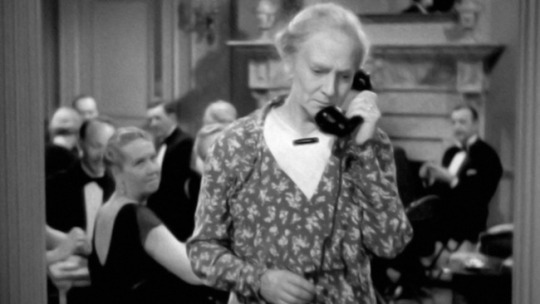
The Criterion Collection’s essays on the film make a lot out of the shift in the second half of the film, extrapolating the statement made in the opening titles about the ‘rift between generations’ into a motif that breaks the film into two acts. Robin Wood, for example, states in ‘With this Ending, I Thee Unwed’ that the final ten sequences of the film reject the value of the family in exchange for the Platonic ideal of the couple, and in doing so implies that there is very little in the way of genuine affection for Bark and Lucy’s relationship from their children. The “four characters who treat the old couple with kindness” that Wood identifies seem to be the first instance of genuine appreciation that appears in the film, but I’m not sure that Make Way is as persuasive on this front as Wood claims. Reading into the details of the interactions the Coopers have with the new owner of the hotel they stayed at on their honeymoon, for instance, it’s hard to tell whether Mr. Norton actually feels a rapport with the couple that is different from what they share with their children (especially as the film has already shown us the genuine affection at least George and Anita have for Lucy at times).
There is definitely a rapport there through much of the last half-hour of the film, but as part of McCarey’s distancing techniques we aren’t given enough information from an outside perspective to determine for sure how the people the Coopers interact with actually feel. Genuine kindness is almost indistinguishable from well-performed professional courtesy, after all. Robin Wood’s analysis might say more about Wood’s own romanticism than about the film itself.
And yet, the second half does feel qualitatively different, because it’s the first time Bark and Lucy get to spend time together, alone. And the relationship feels even more real as a result. I’m a sucker for films about old couples - much as the mistreatment of any nice mother character makes me seethe with hurt and rage - but Make Way for Tomorrow feels like it’s on another level altogether. It’s a beautifully-acted film; not gripping, but tender and acutely observed. Very little stands out about it because it’s so uniformly good, and it thoroughly deserves the critical respect it’s managed to attain.
5 notes
·
View notes
Text
Fear in the Night (1972) (AKA Dynasty of Fear and Honeymoon of Fear)
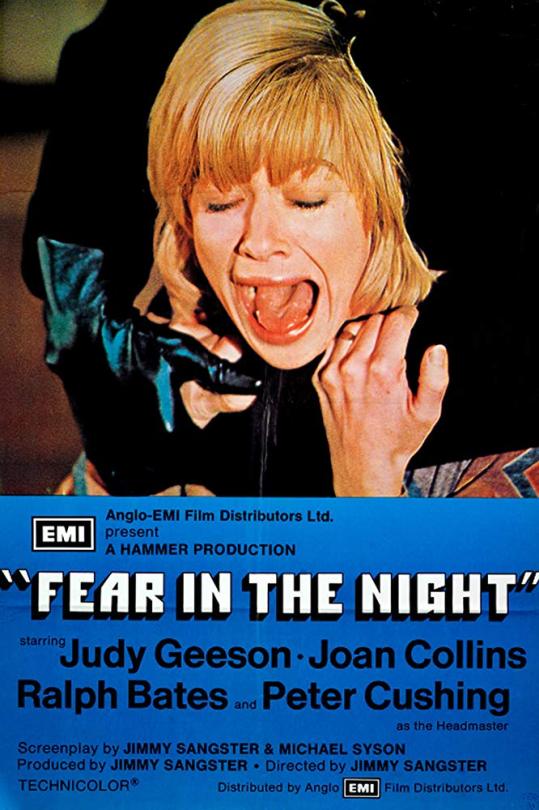
Directed by Jimmy Sangster
Screenplay by Jimmy Sangster and Michael Syson
Music by John McCabe
Country: United Kingdom
Running time: 94 minutes
CAST
Judy Geeson as Peggy Heller
Ralph Bates as Robert Heller
Joan Collins as Molly Carmichael
Peter Cushing as Michael Carmichael
James Cossins as The Doctor
Gillian Lind as Mrs. Beamish
John Bown as 1st Policeman
Brian Grellis as 2nd Policeman
(I watched Fear in The Night on a StudioCanal blu-ray. The picture was perfectly fine, but not “Holy Mother of Pearl!” amazing. But I doubt the movie has ever looked better)
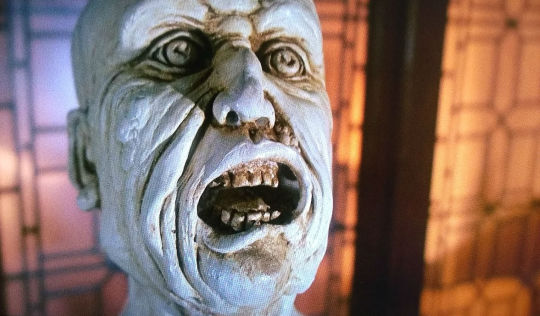
Fear in The Night is a neat enough Hammer thriller (as opposed to a neat enough Hammer horror) from their 1970s Going Downhill period, as the studio tried to accommodate the tastes of a rapidly changing society while not altering very much about their product, and continuing to spend less and less with every movie. Surprisingly often ‘70s Hammer’s answer to this thorny art versus commerce conundrum would be to just stick some tits in. Thankfully Hammer doesn’t do that here, instead they opt for a twisted thriller riffing on the French suspense classic Diabolique (1955), with a subtle hint of Daphne Du Maurier’s Rebecca. But, you know, with Joan Collins and, the eternally camptastic Joan Collins aside, imbued with all the everyday glamour of the 1970s; which is to say all the glamour of the aftermath of a chip pan fire.

This penny pinching presentation of the ‘70s milieu turns out to be Fear in the Night’s secret weapon in its arsenal of entertainment. Movies like this probably looked cheap on release (fair enough, because they were cheap movies) but several decades on the financial inability to cinematically accentuate mundane reality provides a wonderful glimpse of a time mostly past. (Admittedly there remain odd pockets of the 1970s in the UK to this day, but that’s another story.) While I love watching these things for all the usual reasons, I also enjoy the no frills historical accuracy of them. (See also: Amicus and Trigon movies.) An accidental bonus of budgetary miserliness, perhaps, but a bonus nonetheless. Early on before Fear in the Night settles into its cramped arena of psychological combat there’s a particularly great bit at a motorway service station, where you can see that they once sold 12” LPs in spinner racks; on your way to see Aunty Maud, why not pick up the new Peters and Lee platter? Weird stuff, but apparently true. This is only rivalled by the man in the background when Judy and Ralph are in the car park; this unknown guy comes out of the Gents and is captured forever on film checking his fly. Cinéma doesn’t get much more vérité than a guy reflexively checking his cock’s not hanging out.
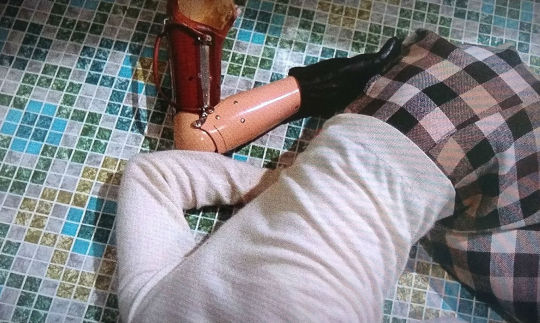
But why are Ralph Bates and Judy Geeson in a car park at a Granada motorway service station? (I just checked and there are still Granada motorway service stations; I did not know that.) It’s because Ralph and Judy are playing newlywed couple Robert and Peggy, on their way to the boys’ boarding school Robert teaches at. Their fragrant wedded bliss hit a recent road bump when Peggy was possibly attacked by a home invader with a prosthetic arm. Or possibly not; Peggy doesn’t seem the full shilling right from the start. Whatever did or didn’t happen has left Peggy in a somewhat sensitive state which imminent plot developments will do nothing to soothe and everything to aggravate. The pair move into a small house near the main school building and Peggy meets the headmaster, the confusingly named Michael Carmichael (Peter Cushing), and his wife Molly (Joan Collins). All you need to know about Molly is that she is played by 1970s Joan Collins; ergo she is a nasty piece of work under all that make-up. Michael Carmichael is a bit harder to get a grip on, partly because he is played by Peter Cushing who always finds nuances in his characters his scripts rarely deserve. He’s the best thing in Fear in the Night, but then he’s the best thing in most things that have “Peter Cushing” in the cast list. Yes, including Star Wars (1977). Actually, especially Star Wars (1977). Peter Cushing isn’t in Fear in the Night much, but he’s in it enough for him to create a character who can twitch from affable gent to spaced out creep in the blink of an eye and still leave you undecided as to whether or not to trust him. It’s called acting, darling.
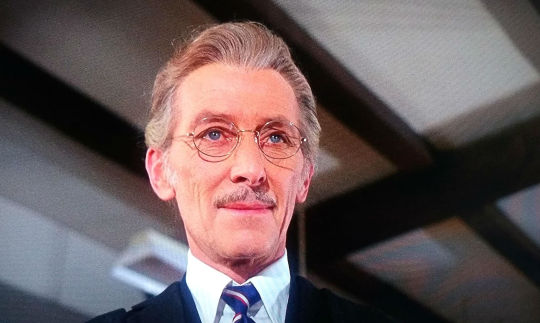
Besides the ever potent screen presence of Peter Cushing, everyone else in the intentionally claustrophobically tiny cast is good value too. Joan Collins is Joan Collins, which is why they cast her, I guess. Ralph Bates has fun being too good to be true, before revealing he is in fact too good to be true. (Not really a spoiler unless you’ve never seen a movie; see further down the page.) Mostly though we chez Mundano were distracted by his appearance. Throughout Fear in the Night Ralph Bates is a kind of variable orange colour with some dusky eye shadows, courtesy of make-up according to my Life Partner; I thought he was just olive skinned and maybe had a bit of Mediterranean in the branches of his family tree. And I may have the edge since Wikipedia tells me Ralph was of French parentage and was (get this) the great-great grandson of Louis Pasteur. There’s a fun Hammer Fact for you; no charge. The core of Fear in the Night, however, is Judy Geeson, who is unrelated to Louis Pasteur as far as I know, but, luckily for audiences everywhere, successfully portrays a woman slowly coming so unstuck she can’t even trust her own senses. Hysteria simmers under the surface of each of her scenes, at least in those scenes where her hysteria isn’t stealing the scene wholesale.
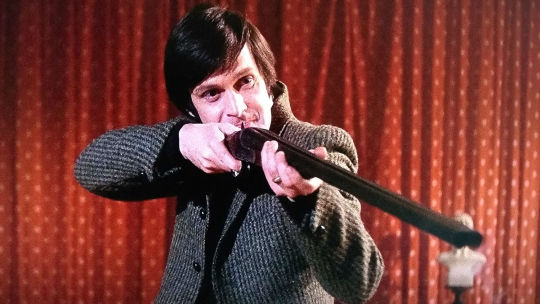
Oh yes, female hysteria is front and centre in this one. Fear in the Night has a typically balanced 1970s approach to the ladies; one’s a brassy shrew and the other is a hysterical girl-child. In case anyone wanted reassurance about how far we’ve come since 1972 gender-wise, Fear in the Night also has a lot of people telling Peggy and Molly how pretty they are, like they are delicate little dolls, and there’s not a few “Oh, those silly ladies and their silly emotions!” reactions to Peggy’s increasingly frenzied appeals for help against her apparently phantom assailant. The only reason no one seeks to blame it all on her “time of the month”, I suspect, is that the ‘70s was still struggling to come to terms with female biological functions. Part of Peggy’s problem is getting men to take her seriously; which is fair enough, as part of any woman’s problems in the 1970s was getting men to take her seriously. In the 2010s men take women seriously; but they hate them for it. But shhhh, it’s a secret.

There are a lot of secrets at play in Fear in the Night, some obvious and some surprising but can Peggy survive their unveiling? You will, naturally, have already twigged what’s going on as soon as Joan Collins turns up shotgunning rabbits and patronising Peggy to within an inch of her life. But, and this is the clever bit, Fear in the Night knows you know this. The initial reveal is so defiantly perfunctory it acts as a kind of slap in the face to your complacency, and then Fear in the Night kicks you in the kidneys with the stuff you weren’t expecting. Basically, don’t organise that ticker tape parade to celebrate your own cleverness until Fear in the Night’s credits roll. Despite Jimmy Sangster’s smart plotting relying heavily on a prosthetic arm, Fear in the Night still has room for a couple of enjoyably nifty tricks up its sleeve. If all else fails; it’s got peter Cushing in. And you can’t argue with a bit of The Cush. And that’s another Hammer Fact; no charge.
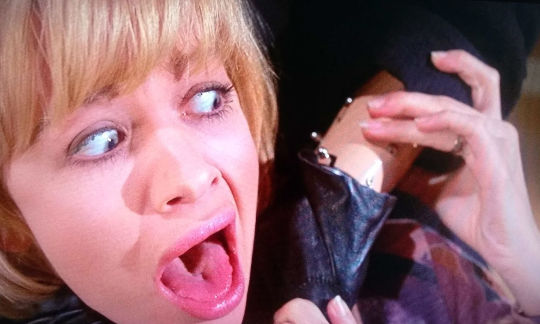
#Movies#Horror#Thriller#Hammer#Fear in the Night#Dynasty of Fear#Honeymoon of Fear#Jimmy Sangster#Judy Geeson#Ralph Bates#Joan Collins#Peter Cushing#The 1970s#1972
3 notes
·
View notes
Text
Epilogues: Candy, chapters 1-5
This is gonna get long.
The Candy route is, in effect, the route where John refuses to go back to finish off Lord English, but remains on Earth C. Instead, the story begins by picking up another long neglected thread: Gamzee. Then it continues to various other places.
Contains: a rough recap of Gamzee’s story, a longwinded attempt to be evenhanded and not callous about the Gamzee Discourse, because it’s relevant again... and then I read the next three chapters, which visit some of the other characters, setting up the board for the new story (because let’s be real, this is a whole new story of its own at this point!)
a quick recap
It’s been three years since the comic ended so I’m gonna recap what I remember about Gamzee’s story. He was sent on a murderous rampage in the ‘murderstuck’ arc - there’s some debate if he was acting according to his own will, or that of Lord English’s agents, there, but either way he killed a large number of the ‘beta trolls’. He was ultimately stopped by Karkat, who deployed the ‘shoosh pap’ of establishing moirallegiance. During the three year meteor voyage, he entered into some kind of very harmful kismesis relationship with Terezi, but got very little screen time. And uh... then I get confused.
In the “game over” arc, he is mind controlled - I recall by Aranea - and used to bring about the deaths of most of the cast. This, of course, was retconned. Also I think I skipped over a bit.
And, in some capacity, he was present when Caliborn won the contest for dominance with Calliope. He assisted the young Caliborn’s villainous plan, and for his trouble got repeatedly shot to pieces, which he took silently.
And at some point he got locked in a fridge by the rest of the cast. We briefly see him get knocked about in there during ‘Collide’, and then he makes no further appearance.
Let’s go on the Homestuck wiki and see what I missed...
while under the sway of Lord English (murderstuck arc), he caused some of the kids to receive Lil Cal and a harlequin doll, which is what made their session ‘terminal’
he intervened in the alpha session, and was responsible for the prototypings of various dead trolls into combined forms
this:
The fridge remained on LOTAK until Lord Jack was decapitated which resulted in a black hole, somehow taking Gamzee, Crowbar's crowbar and Yaldabaoth to future Earth.
so i guess i missed that in all the chaos of Collide, but that explains how he ended up in Caliborn’s world.
also crucially, half of Gamzee is absorbed into Lil Cal along with Caliborn and Arquiussprite, which creates Lord English, the series villain.
so anyway...
The initial premise of this story is: John decides to remain in the C universe and enjoy his life instead of living in an undecisive fugue, rather than go out to fight Lord English and wrap up that side of the plot. Calliope makes a request of him: he should use his retcon powers to pull Gamzee out of the plot, someone ‘only he can save’.
The second chapter is basically a very sarcastic discourse post in Gamzee’s voice. Shortly after being rescued, Gamzee goes onto a long speech about how he’s prepared to redeem himself, and the ‘mitigating factors’ that make him worthy of redemption: (an ‘abusive childhood’ at the hands of his goat dad, and his socialisation). I’ll excerpt a bit to give you the general flavour, with the typing quirk removed for readability:
gamzee: i been all like. abused and stuff, homies.
gamzee: as a child, i got motherfuckin neglected on by a stern old fatherly goat.
gamzee: i was a disappointment on him, and can’t says i blame him for abandoning the shit out of his useless kid.
gamzee: i woulda motherfuckin done the same shit at me if i was a big cruel goat.
gamzee: so that explains like, pretty sure most of my crimes in a way that makes a motherfucker wanna take his forgiveness out for a fucking spin.
gamzee: there’s other reasons to consider, like...
gamzee: shit that makes this redemption arc fuckin tight like an uncracked elixir.
gamzee: like, hows my purple blood meant i got the culture pressures put on me to be a salty damn jester for life.
gamzee: what about that hand the messiahs dealt me, my bitches.
gamzee: a motherfucker’s gonna envy that like a wicked cod rash.
gamzee: so how can i full and truly fuckin get blamed on for, when it comes to a little bit of subjugglation i got culturally hornswoggled up to doing, and also tragically goat abused which needs to make you shed a tear for this motherfucker, lest you wanna be as atrocious as me.
This is reminiscent of V’s episodes in Friendsim, insofar as - we’re clearly not intended to buy it, but it’s directly mocking lines of argument in the fandom, about whether it’s ok to be a fan of Gamzee (because fandom is all about casting moral judgement on finding that you relate to fictional characters’ narratives in the wrong way, justifying your own attachments to characters and works as progressive, etc...).
By putting these arguments in a very explicit and ridiculous form (having Gamzee speak on whether he personally deserves a ‘redemption arc’), and then having the narrator and also popular characters such as Terezi dismiss them, V’s stance is fairly clear - at least these particular readings of Gamzee are to be dismissed. Terezi comments:
JOHN: apparently we’re going to let him have a “redemption arc”?
TEREZI: H4H4H4H4H4H4H4H4H4H4H4H4
JOHN: yeah, it’s...
JOHN: well, what is there to even say?
JOHN: it’s literally the dumbest fucking idea i’ve ever heard, but what can you do.
TEREZI: SHOV3 H1M B4CK 1N TH4T FR1DG3 4ND THROW 1T 1N TH3 OC34N, 1S WH4T
There’s two ways the story can go from here. One might be that this is the last we’re going to hear about Gamzee, it’s just a quick fuck you to one particular set of readings of Homestuck, and then on to whatever V considers more important. Another is that, a more subtle story is about to be told than the deliberately absurd framing here.
I should state my own stance, since it’s probably going to be relevant. I had a friend who cared a great deal about Gamzee, in part because he was essentially a chew toy in the latter part of the comic, who could be treated violently without consequence, which - as far as I understand their feelings - my friend found meaningful in relation to their own experiences of abuse.
I recall thinking there was some credence to ‘mind control’ interpretations, which posit that the difference between Gamzee’s chill affect early on and his ludicrously violent behaviour later was the control of Doc Scratch and other agents of Lord English; Gamzee in this reading is aware, and horrified (as hinted at by a brief window where Aranea’s mind control is released during the Game Over arc and he is ‘himself’ again, and cries and begs for mercy, before once again becoming extremely violent). Whether this is the case during the ‘fridge’ section is not clear. This goes some way to explaining why Gamzee is indestructible, and mutely devoted to assisting Caliborn when Caliborn treats him with nothing but violence.
In this reading, Gamzee is a tragic character to the point of absurdity. He is forced to witness another person committing horrific actions with his body, and then abandoned by those who’d care for him because they do not recognise the mind control. His only escape from one mind controller is another one.
However, that’s just a reading. For fans who identify strongly with Terezi, Gamzee is often interpreted as her abuser due to the effect his relationship is shown to have during the asteroid voyage (pre-Game Over). To these readers, people - such as my friend - who identify with Gamzee are engaging in apologetics for abuse.
Because this is so fraught, I am not going to make any claim that a particular reading of Gamzee is ‘unambiguously true’. I think a third interpretation is the ‘shitty writing’ one, that Hussie basically intended Gamzee as a joke character, not one with interiority. He’s a scary clown! Perhaps he didn’t realise how strongly this character, who from the start was presented as someone to laugh at, would resonate with the readers.
I hope that this discussion gives some sense of the different possible nuances of Gamzee, and I am hoping that this epilogue will not simply be a polemic for one particular reading.
now, chapter 3+
I read the first two chapters right after I heard about the upd8. From now on, this will be a true ‘liveread’, i.e. written alongside my first readthrough of the story.
At this point we switch viewpoint character to Dirk! This is a very short chapter: Dirk cancels ‘everything’ - all his ongoing plans - and does not explain why to Jane, or Jake. Whatever the reason is, it’s very bad news and has a short time limit.
Apparently John’s decision to say has had some kind of metaphysical effect, which causes Rose’s mysterious malady - and her various anxieties concerning ‘canon’ - to dissipate.
So she gets to spend some time with Kanaya. This is nice - we barely got to see Rose and Kanaya together as a couple in canon. It’s a sweet conversation... and makes me worry about what’s going to happen in the ‘Meat’ route.
There’s a little clarifying on Jade, Dave and Karkat’s relationship now...
JADE: i never thought id be thinking of you as my weird nerd friend by the time we were in our twenties
It’s a weird, intimate, and uncomfortably close to sexual thing to be doing in front of other people. Dave and Karkat share a vaguely mortified look. Jade sort of lives here, but she doesn’t that sort of live here.
The expression is so warm and blatant that it can’t help but draw Jade’s attention. She frowns and pushes her glasses up the bridge of her nose, making some quick calculations in her head. They’re so obvious, she thinks, and yet here they are. Virginal losers who are performative about sitting exactly a foot apart whenever they’re in public. It’s so pathetic it makes her want to howl at the moon in sorrow.
so i guess we’re going to have a jade working very hard on getting dave and karkat together type arc
well i guess we are but oof, jade what the hell... jade decides to like, go in with all the subtlety of a train, aggressively flirt with karkat, up to the point of like, putting her fingers in his mouth... which to him is just like, a straight up assault. but it’s them who are ‘hopeless’, not her...
dave very awkwardly changes the subject to talk about the possible Jane presidency. apparently, Jane is very xenophobic towards trolls (which didn’t seem immediately apparent from the comic but I might have forgotten tbh). Karkat speaks of ‘the potential genocide of my people’
DAVE: but i dont think shed go so far as to commit genocide
DAVE: thats really exaggerating her faults
DAVE: like wed have to get pretty far away from the people we were when we started all this for that to be a viable outcome
...phrasing it like that... makes me rather apprehensive!
3 notes
·
View notes
Text
so im gonna do that AAW meme thing! cw: tmi about aza’s thrilling life, some cringey or vaguely depressing/upsetting anecdotes, some happy things in a silly way, and fandom
1. Sunday, 21 October:
o Describe your experience of finding out about asexuality/the ace spectrum. What source(s) did you find it from? How did it feel to find out about asexuality? How did it change your life?
~Sherlock BBC fandom~! /o/ Yeaaaaah.
To be precise, the kink meme, on livejournal. just a random prompt asking for something exploring the arrangement between asexual sherlock and uhhh probably john but tbh i don’t remember that. maybe Irene. I’m almost sure this was right after the Scandal in Belgravia episode had aired, and that episode was why people were playing with the idea of Sherlock being uninterested in sex.
I don’t remember my exact feelings when I read that word, but I do remember that I was delighted at the concept (+ the discussion in the same episode about falling in love outside of your sexual orientation) and immediately convinced, that I jumped into researching asexuality, and that barely a few weeks later I was very deep in contemplating and musing about my own levels of attraction and sorting out all that stuff. I do think I just instantly realized this concept applied to me; I found the AVEN site and its definitions very fast, and grey-a felt good instantly. (I found demi later, and it took me a bit longer to claim it for myself, though I don’t remember much details about that.)
Like, years later I’m very much bitter about and Over™ Sherlock BBC, its writers, and that episode in particular and their stance on the sexualities and orientations of all their characters, but... it did bring me something very precious, that it would have taken me years to find out about otherwise.
It did change my life in that this is when I realized that I really, really, really didn’t have to date, have sex, marry or whatever “one day” if I never wanted to and I wasn’t “late” on anything. Took off a lot of pressure, and also made me stop trying to dub-con myself into accepting things I didn’t actively want just because I didn’t actively hate them.
2. Monday, 22 October:
o Talk about your coming out experience. Of course, one many never be finished coming out, but you could describe how you came out to friends, what reactions you have gotten, how you have felt by coming out, and more.
Mm, two:
not quite coming out, and I don’t remember how it came up, but I mentioned “ok but what about asexuality” at my mother, perhaps a year or two after finding out about it, and she just scoffed and said “that’s not a thing, it’s just being scared of sex,” and I just... froze. Blanked out. Zoned out. Possibly shook a little. This was my first first-hand experience of being just... disacknowledged, erased, denied out of existence, and I had absolutely not expected it, nor the violence of it, nor the casual quality of that violence. I couldn’t say anything in reply, and I don’t think my mother noticed anything at all.
on another hand, I once explained to a gay male friend of mine that, well, I don’t call myself a lesbian, I like girls but I don’t call my super-duper-precious-friend my girlfriend, we are extremely close but we don’t have sex or really date, I’m asexual; and his reaction was “?? THAT’S SO COOL. That fits you! I’m glad for you that you can just do whatever works for you without following conventions about relationships! Cool, great!” and that just made my day.
3. Tuesday, 23 October:
o Describe your experience of confronting stereotypes. There are many stereotypes or expectations of what being on the ace spectrum is like, but of course aspec people are just as diverse as any other group. How have you defied or corrected these stereotypes?
uuhhhhh
Mostly this happens when I talk about asexuality with people who are questioning themselves, explaining the many different flavors it can come in, that yeah you can be asexual at the same time as enjoying sex, masturbating, having fantasies, wanting to date, etc. Not so much smashing established stereotypes, more confirming that nop this thing that you think would “disqualify” you from being asexual doesn’t, actually, you still might be, you’re not “fake”.
4. Wednesday, 24 October:
o Talk about positive representation of aspec people in media which has benefited you or speaks to you strongly. Aspec people are not often represented in media, so it will be nice to see which representations have the strongest impacts.
*STANDS UP, VIBRATING*
TWENTYACETEEN!!!!!!!!!!!!
This year I got two cases of explicit, confirmed, canon, accurate and nuanced representation with central characters in two series that were already extremely close to my heart, and I’m so happy about it!!!!
Spoilers for both fandoms!
1) Shimanami Tasogare: a recently finished manga about LGBT community. In one of the last arcs, we learn that the very central yet mysterious character Anonymous (Dareka-san) is asexual. Like, the character says it, in full letters, and it’s discussed a lot.
Well, it’s more complicated than that, because it’s set in Japan and written in Japanese and Japan has different approaches, concepts and vocabulary around asexuality than English-language; what Anonymous initially describes might be closer to what English-language would call aromanticism. But they also later go “Am I interested in sex, or not? Who knows :)”, with their potential interest in sex represented with them reading porn magazines, and they’ve already expressed that they’re not interested in dating, so as it happens they’re probably both aro and ace (in English terms) anyway. (In the same sequence, they also explain that they might be male, or female, and generally aren’t overly concerned with how people think of them, anything works for them.)
This brings the other characters to think some more about their own desires for love, sex, relationships, human contact... There is a beautiful scene where the main character thinks that knowing this lets him finally understand Anonymous, that this must be why they are so mysterious and detached and fleeting — and Anonymous tells him point-blank that nah. They’re not just their asexuality. Don’t reduce them to that. They’re not “anonymous” because they’re asexual, and vice-versa — those are just two incidental parts of who they are. They are a full person, who just happens to be asexual, and also to enjoy being anonymous and unknown and find freedom in living their life this way.
It was just incredible to read entire chapters dedicated to a central character talking at length about their asexuality, and also how they relate, not only to straight people, but also to queer non-ace people. In the end the main character still doesn’t quite get Anonymous, and that’s how they like it.
2) The Magnus Archives: an ongoing horror podcast that’s casually LGBTQIA-friendly. (Like, a lot of horrible stuff does happen to queer people, but that’s because there’s a lot of them, and I do think that statistically more of them survive than straight people. Equal opportunity horror.) I had been toying with headcanoning the main character Jon as asexual for a variety of reasons for a while, and then in an episode that aired a few months ago a character casually mentioned that “apparently [he] just... doesn’t. At all.” Asked to elaborate, the writer confirmed on twitter that yup, he’s written as asexual (though who knows if Jon would use that word himself, he doesn’t really think about it).
I’m especially delighted because this came up, in context, because Jon has dated. At least once. We know his ex, and she is super chill with him. This reveal also comes up in the same breath as the reveal that a male character seems to have a crush on him, and IMO the show seems to hint that said character is aware that Jon doesn’t do sex, and doesn’t/wouldn’t mind this if they were to date.
Jon did start out as the usual cold, rational, unempathetic character archetype (in fact, he’s very reminiscent of BBC’s Sherlock in early episodes), but by the time this line comes up, the listener knows that he actually cares a lot and is full of emotions. He’s shown to be very, very protective of the people close to him — though also very bad at it. And at expressing it. But, still around the same time of the ace reveal, he is making deliberate efforts to communicate more and value everyone’s feelings. And of course, being the central character, he’s a veeeeery developed character with tons of evolution and nuances, and a huge fandom fave. The reveal that’s he’s asexual has changed exactly nothing in the show; but, like I said, it fits him, he read as asexual to the point that I was suspecting it despite zero real textual evidence until then.
When this episode came out and I heard that line (... I actually had missed it on first listen), I was at work, and I just started almost crying at my desk.
And then I got to go around yelling about it at my fandom friends.
... And at my non-fandom friends.
4 notes
·
View notes